Ry Cooder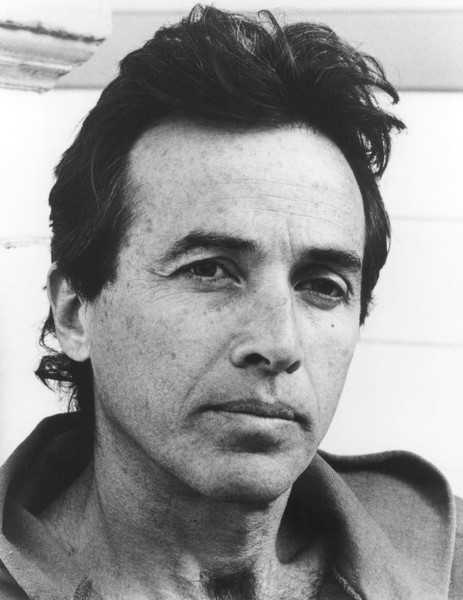 | ||
| Allmusic Biography : Whether serving as a session musician, solo artist, or soundtrack composer, Ry Cooders chameleon-like fretted instrument virtuosity, songwriting, and choice of material encompass an incredibly eclectic range of North American musical styles, including rock & roll, blues, reggae, Tex-Mex, Hawaiian, Dixieland jazz, country, folk, R&B;, gospel, and vaudeville. In addition to his American music bona fides, Cooder is an unofficial American cultural ambassador: He was partially responsible for bringing together the Cuban musicians known globally as the Buena Vista Social Club, recording with Ali Farka Toure, Vishwa Mohan Bhatt, and Manuel Galban, to name scant few. During the 80s and 90s he was a celebrated film composer, scoring works such as Walter Hills The Long Riders, Wim Wenders Paris, Texas and The End of Violence, and Tony Richardsons The Border. Since 1989, he has won six Grammy Awards and been nominated for many more in genres ranging from childrens music and folk, to Latin (pop and traditional), Americana, and world music. Among his most notable albums in the 21st century were the conceptual albums Chavez Ravine, about an LA neighborhood bulldozed to make way for bringing the Dodgers baseball team to Los Angeles, and San Patricio with the Chieftains, about a band of immigrant Irish soldiers that deserted the American Army during the Mexican-American War to fight for the other side. The 16-year-old Cooder began his career in 1963 in a blues band with Jackie DeShannon and then formed the short-lived Rising Sons in 1965 with Taj Mahal and Spirit drummer Ed Cassidy. Cooder met producer Terry Melcher through the Rising Sons and was invited to perform at several sessions with Paul Revere & the Raiders. During his subsequent career as a session musician, Cooders trademark slide guitar work graced the recordings of such artists as Captain Beefheart (Safe as Milk), Randy Newman, Little Feat, Van Dyke Parks, the Rolling Stones (Let It Bleed, Sticky Fingers), Taj Mahal, and Gordon Lightfoot. He also appeared on the soundtracks of Candy and Performance. Cooder made his debut as a solo artist in 1970 with a self-titled album featuring songs by Leadbelly, Blind Willie Johnson, Sleepy John Estes, and Woody Guthrie. The follow-up, Into the Purple Valley, introduced longtime cohorts Jim Keltner on drums and Jim Dickinson on bass, and it and Boomers Story largely repeated and refined the syncopated style and mood of the first. In 1974, Cooder produced what is generally regarded as his best album, Paradise and Lunch, and its follow-up, Chicken Skin Music, showcased a potent blend of Tex-Mex, Hawaiian, gospel, and soul, and featured contributions from Flaco Jimenez and Gabby Pahinui. In 1979, Bop til You Drop was the first major-label album to be recorded digitally. In the early 80s, Cooder began to augment his solo output with soundtrack work on such films as Blue Collar, The Long Riders, and The Border; he has gone on to compose music for films such as Paris, Texas, Streets of Fire, Alamo Bay, Blue City, Crossroads, Cocktail, Johnny Handsome, and Steel Magnolias, among others. Music by Ry Cooder (1995) compiled two discs worth of highlights from Cooders film work. In 1992, Cooder joined Keltner, John Hiatt, and renowned British tunesmith Nick Lowe, all of whom had played on Hiatts Bring the Family, to form Little Village, which toured and recorded one album. Cooder turned his attention to world music, recording the album A Meeting by the River with Indian musician V.M. Bhatt. Cooders next project, a duet album with renowned African guitarist Ali Farka Touré titled Talking Timbuktu, won the 1994 Grammy for Best World Music Recording. His next world crossover would become one of the most popular musical rediscoveries of the 20th century. In 1997, Cooder traveled to Cuba to produce and play with a group of son musicians who had little exposure outside of their homeland. The resulting album, Buena Vista Social Club, was a platinum-selling international success that made stars of Compay Segundo, Ibrahim Ferrer, and Rubén González, and earned Cooder another Grammy. He continued to work on projects with his Buena Vista bandmates, including a collaboration with Manuel Galbán in 2003 titled Mambo Sinuendo. His other work in the 2000s included sessions with James Taylor, Aaron Neville, Warren Zevon, and Spanish diva Luz Casal. In 2005, Cooder released Chavez Ravine, his first solo album since 1987s Get Rhythm; the album was the first entry in a trilogy of recordings about the disappearance of Los Angeles cultural history as a result of gentrification. Chavez Ravine was followed by My Name Is Buddy in 2007, and the final chapter in the saga I, Flathead in 2009. In 2010, Cooder was approached by Paddy Moloney of the Chieftains to produce an album. Moloney had been obsessed with an historical account of the San Patricios, a band of immigrant Irish soldiers who deserted the American Army during the Mexican-American War in 1846 to fight for the other side, against the Manifest Destiny ideology of James Polks America. Cooder agreed and the result was San Patricio, which brings this fascinatingly complex tale to life. In early 2011, Cooder was taken by a headline about bankers and other moneyed citizens whod actually profited from the bank bailouts and resulting mortgage and economic crisis, and wrote the song "No Banker Left Behind," which became the first song on 2011s Pull Up Some Dust and Sit Down, an album that reached all the way back to his earliest recordings for musical inspiration while telling topical stories about corruption -- political and social -- the erasure and the rewriting of American history, and an emerging class war. A month after its release, Beat poet Lawrence Ferlinghettis fabled City Lights publishing house issued Cooders first collection of short fiction entitled Los Angeles Stories. He continued to follow his socio-political muse with Election Special, released in the summer of 2012, and in 2013 released Live in San Francisco, his first live album in 35 years, with Corridos Famosos (son Joachim on percussion, Flaco Jimenez on accordion, Robert Francis on bass, and vocalists Terry Evans, Arnold McCuller, and Juliette Commagere). The ten-piece Mexican brass band La Banda Juvenil also guested. In 2014, Rhino Records offered an epic-scale look at Cooders work in film scoring with Soundtracks, a seven-disc box set compiled from his movie music of the 80s and 90s. After playing mainly bluegrass and country gospel songs with Ricky Skaggs in 2017, Cooders percussionist son Joachim convinced his dad to cut an album of country and blues-gospel songs. The younger Cooder arranged the 11-song set and the guitarist fleshed them out for a band. Entitled The Prodigal Son, it comprising eight covers including songs by the Pilgrim Travelers, Blind Willie Johnson, Carter Stanley, and three originals. In late March, Cooder released a preview video of an arrangement of the title track recorded live in studio. The Prodigal Son was issued in May 2018 and followed by his first American tour in 15 years; he was backed by his own band (with Joachim on drums and percussion) with backing vocals by the Hamiltones. | ||
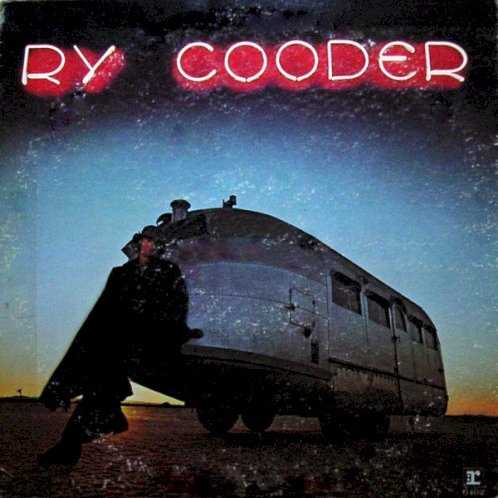 | Album: 1 of 40 Title: Ry Cooder Released: 1970 Tracks: 11 Duration: 30:27 Scroll: Up Down Top Bottom 25% 50% 75% Spotify Wikipedia Allmusic AlbumCover | 1 Alimony (02:58) 2 France Chance (02:49) 3 One Meat Ball (02:30) 4 Do Re Mi (03:05) 5 My Old Kentucky Home (Turpentine & Dandelion Wine) (01:48) 6 How Can a Poor Man Stand Such Times and Live? (02:45) 7 Available Space (02:14) 8 Pigmeat (03:10) 9 Police Dog Blues (02:48) 10 Goin to Brownsville (03:28) 11 Dark Is the Night (02:47) |
| Ry Cooder : Allmusic album Review : Already a seasoned music business veteran at the age of 22, Ry Cooder stepped out from behind the shadows of the likes of Jackie DeShannon, Taj Mahal, the Rolling Stones, and Captain Beefheart, signing his own deal with Warner Brothers records in 1969. Released the following year, Cooders eponymous debut creates an intriguing fusion of blues, folk, rock & roll, and pop, filtered through his own intricate, syncopated guitar; Van Dyke Parks and Lenny Waronkers idiosyncratic production; and Parks and Kirby Johnsons string arrangements. And while hes still finding his feet as a singer, Cooder puts this unique blend across with a combination of terrific songs, virtuosic playing, and quirky, yet imaginative, arrangements. For material, Cooder, the son of folklorist parents, unearths ten gems -- spanning six decades dating back to the 1920s -- by legends such as Woody Guthrie, Blind Blake, Sleepy John Estes, and Leadbelly, as well as a current Randy Newman composition. Still, as great as his outside choices are, its the exuberant charm of his own instrumental "Available Space" that nearly steals the show. Its joyful interplay between Cooders slide, Van Dyke Parks music hall piano, and the street-corner drumming creates a piece that is both loose and sophisticated. If "Available Space" is the records most playful moment, its closer, "Dark Is the Night," is the converse, with Cooders stark, acoustic slide extracting every ounce of torment from Blind Willie Johnsons mournful masterpiece. Some of the eccentric arrangements may prove to be a bit much for both purists and pop audiences alike, but still, Cooders need to stretch, tempered with a reverence for the past, helps to create a completely original work that should reward adventurous listeners. | ||
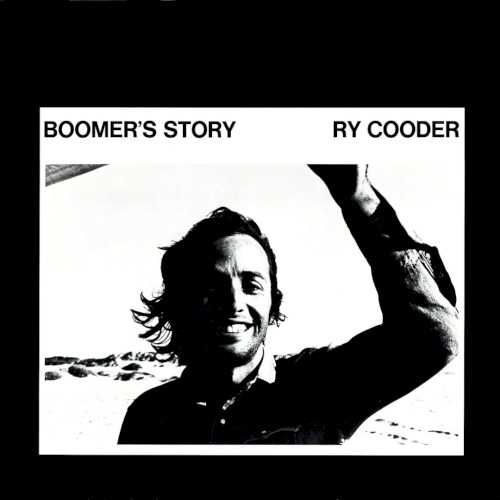 | Album: 2 of 40 Title: Boomers Story Released: 1972 Tracks: 10 Duration: 39:06 Scroll: Up Down Top Bottom 25% 50% 75% Spotify TrackSamples Wikipedia Allmusic AlbumCover | 1 Boomers Story (04:15) 2 Cherry Ball Blues (04:13) 3 Crow Black Chicken (02:20) 4 Ax Sweet Mama (04:27) 5 Maria Elena (04:32) 6 Dark End of the Street (03:27) 7 Rally round the Flag (03:40) 8 Comin In on a Wing and a Prayer (03:03) 9 President Kennedy (04:38) 10 Good Morning Mr. Railroad Man (04:31) |
| Boomer's Story : Allmusic album Review : Boomers Story, Ry Cooders third record, continues his archeological dig through musics familiar and forgotten past. As was the case with his previous recordings, he not only looks to the masters -- including blues legend Sleepy John Estes, songwriter Dan Penn (both of whom appear here) and the great Skip James -- for material, but to lost and neglected pieces of American folk and blues, as well. Cooder adds the traditional title-track, which opens the album, and Lawrence Wilsons "Crow Black Chicken," which dates back to the late 1920s, to this collection of discoveries -- both of which are handled with just the right balance of personality and reverence. Elsewhere, he injects a dark irony into the jingoistic "Rally Round the Flag," with its slow, mournful piano (played by Randy Newman) and slide guitar, while the Joseph Spence-style guitar arrangement of the World War II standard "Comin in on a Wing and a Prayer" has a sense of hope and conviction. Often criticized for possessing a less than commanding voice, Cooder steps back from the microphone for four of the albums ten tracks -- three instrumentals and one featuring Sleepy John Estes on his own "President Kennedy." And while all of the instrumentals presented here are fine renditions of great tunes, its "Dark End of the Street" which truly stands out. Here, Cooder realizes that the only thing in his arsenal that can do justice to James Carrs definitive version is his own remorseful slide guitar. Without uttering a single lyric, hes able to convey the shame and deep regret of the Dan Penn/Chips Moman classic. Thanks to moments like this, along with Cooders consistently strong choice of material and brilliant guitar work, Boomers Story -- less eccentric than his first, and less eclectic than Into the Purple Valley -- ranks among his best work | ||
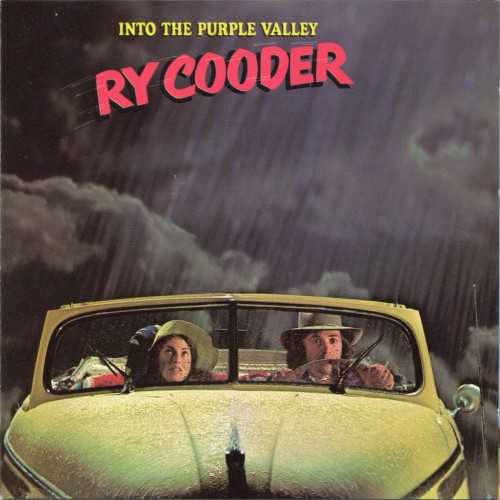 | Album: 3 of 40 Title: Into the Purple Valley Released: 1972 Tracks: 11 Duration: 37:46 Scroll: Up Down Top Bottom 25% 50% 75% Spotify TrackSamples Wikipedia Allmusic AlbumCover | 1 How Can You Keep Moving (Unless You Migrate Too) (02:28) 2 Billy the Kid (03:48) 3 Money Honey (03:29) 4 FDR in Trinidad (03:05) 5 Teardrops Will Fall (03:05) 6 Denomination Blues (04:00) 7 On a Monday (02:57) 8 Hey Porter (04:42) 9 Great Dream from Heaven (01:55) 10 Taxes on the Farmer Feeds Us All (03:56) 11 Vigilante Man (04:15) |
| Into the Purple Valley : Allmusic album Review : Ry Cooder is known as a virtuoso on almost every stringed instrument, and on Into the Purple Valley, he demonstrates this ability on a wide variety of instruments. The main focus of the music here is on the era of the Dust Bowl, and what was happening in America at the time, socially and musically. Songs by Woody Guthrie, Leadbelly, and a variety of others show Cooders encyclopedic knowledge of the music of this time, combined with an instinctive feel for the songs. Phenomenal is the descriptive word to describe his playing, whether it is on guitar, Hawaiian "slack key" guitar, mandolin, or the more arcane instruments he has found. This is a must for those who love instrumental virtuosity, authentic reworkings of an era, or just plain good music. | ||
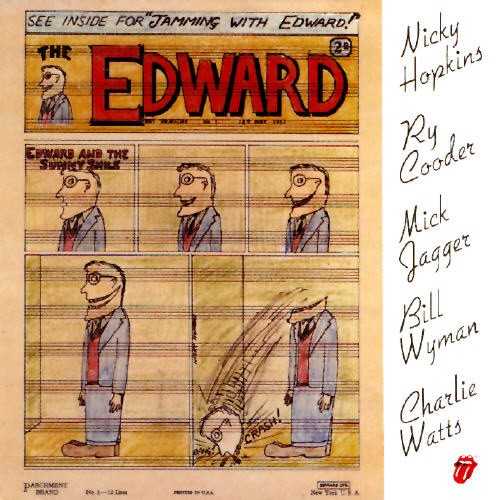 | Album: 4 of 40 Title: Jamming With Edward! Released: 1972 Tracks: 6 Duration: 36:07 Scroll: Up Down Top Bottom 25% 50% 75% Spotify Wikipedia Allmusic AlbumCover | 1 The Boudoir Stomp (05:13) 2 It Hurts Me Too (05:12) 3 Edwards Thrump Up (08:11) 4 Blow With Ry (11:05) 5 Interlude a la el Hopo (02:04) 6 Highland Fling (04:20) |
| Jamming With Edward! : Allmusic album Review : Though many feel that the Stones were at their best when playing loose, sloppy rock & roll à la Exile on Main St., with this 1972 release on Rolling Stones Records the unrehearsed style of the album is more of a hindrance than a call to ragged glory. Not an official Rolling Stones release, the assembled band does contain three-fifths of the group (Mick Jagger, Bill Wyman, and Charlie Watts) along with session man extraordinaire Nicky Hopkins and guitarist Ry Cooder. The band stumbles through keyboard-dominated original numbers such as "Boudoir Stomp" and "Edwards Thrump Up," as well as more conventional cuts like a cover of Elmore James "It Hurts Me Too." Yet the songs never get beyond giving the listener the impression they were thrown together during a drunken nights rehearsals. In that sense the album is a bit of a letdown; though any Stones fan would surely clamor for lost material from the bands golden age, Jamming With Edward instead makes one wish it had never been released. | ||
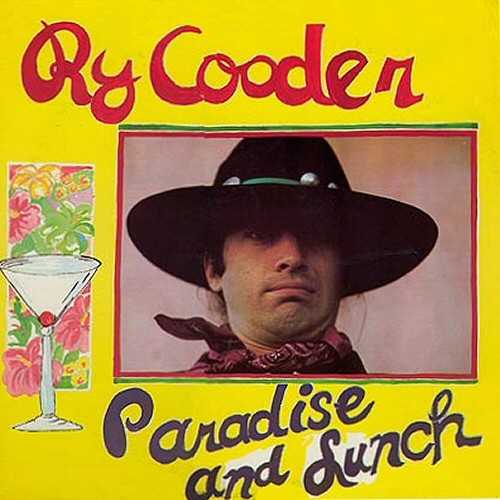 | Album: 5 of 40 Title: Paradise and Lunch Released: 1974 Tracks: 9 Duration: 37:22 Scroll: Up Down Top Bottom 25% 50% 75% Spotify TrackSamples Allmusic Wikipedia AlbumCover | 1 Tamp em Up Solid (03:22) 2 Tattler (04:19) 3 A Married Mans a Fool (03:14) 4 Jesus on the Mainline (04:10) 5 It’s All Over Now (04:53) 6 Im a Fool for a Cigarette / Feelin Good (04:28) 7 If Walls Could Talk (03:15) 8 Mexican Divorce (03:57) 9 Ditty Wah Ditty (05:42) |
| Paradise and Lunch : Allmusic album Review : Ry Cooder understands that a great song is a great song, whether it was written before the Depression or last week. Still, at the same time he isnt afraid to explore new avenues and possibilities for the material. Like his three previous records, Paradise and Lunch is filled with treasures which become part of a world where eras and styles converge without ever sounding forced or contrived. One may think that an album that contains a traditional railroad song, tunes by assorted blues greats, and a Negro spiritual alongside selections by the likes of Bobby Womack, Burt Bacharach, and Little Milton may lack cohesiveness or merely come across as a history lesson, but to Cooder this music is all part of the same fabric and is as relevant and accessible as anything else that may be happening at the time. No matter when it was written or how it may have been done in the past, the tracks, led by Cooders brilliant guitar, are taken to new territory where they can coexist. Its as if Washington Phillips "Tattler" could have shared a place on the charts with Womacks "Its All Over Now" or Little Miltons "If Walls Could Talk." That hes successful on these, as well as the Salvation Army march of "Jesus on the Mainline" or the funky, gospel feel of Blind Willie McTells "Married Mans a Fool," is not only a credit to Cooders talent and ingenuity as an arranger and bandleader, but also to the songs themselves. The album closes with its most stripped-down track, an acoustic guitar and piano duet with jazz legend Earl "Fatha" Hines on the Blind Blake classic "Ditty Wah Ditty." Here both musicians are given plenty of room to showcase their instrumental prowess, and the results are nothing short of stunning. Eclectic, intelligent, and thoroughly entertaining, Paradise and Lunch remains Ry Cooders masterpiece. | ||
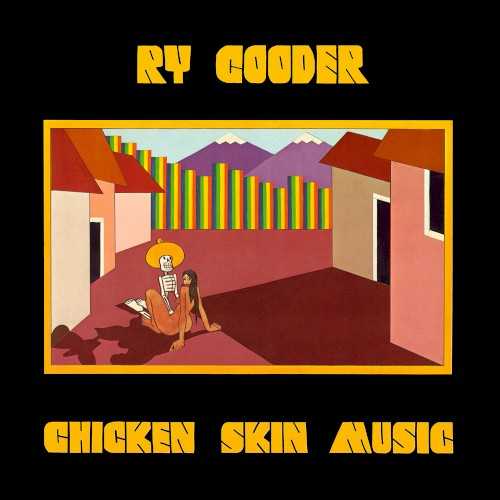 | Album: 6 of 40 Title: Chicken Skin Music Released: 1976 Tracks: 9 Duration: 39:59 Scroll: Up Down Top Bottom 25% 50% 75% Spotify TrackSamples Allmusic AlbumCover | 1 The Bourgeois Blues (03:24) 2 I Got Mine (04:28) 3 Always Lift Him Up/Kanaka Wai Wai (06:03) 4 Hell Have to Go (05:09) 5 Smack Dab in the Middle (03:19) 6 Stand by Me (03:43) 7 Yellow Roses (06:12) 8 Chloe (03:04) 9 Goodnight Irene (04:32) |
| Chicken Skin Music : Allmusic album Review : Ry Cooder has always believed in the "mutuality in music," and this may be no more evident in his career than with his fifth album, Chicken Skin Music (a Hawaiian colloquialism, synonymous with goosebumps). Even more than usual, Cooder refuses to recognize borders -- geographical or musical -- presenting "Stand By Me" as a gospel song with a norteño arrangement, or giving the Jim Reeves country-pop classic, "Hell Have to Go," a bolero rhythm, featuring the interplay of Flaco Jimenezs accordion and Pat Rizzos alto sax. Elsewhere, he teams with a pair of Hawaiian greats -- steel guitarist and singer Gabby Pahinui and slack key guitar master Atta Isaacs -- on the Hank Snow hit "Yellow Roses" and the beautiful instrumental "Chloe." If Cooders approach to the music is stylistically diverse, his choice of material certainly follows suit. Bookended by a couple of Leadbelly compositions, Chicken Skin Music sports a collection of songs ranging from the aforementioned tracks to the charming old minstrel/medicine show number "I Got Mine" and the syncopated R&B of "Smack Dab in the Middle." Also included is Appalachian songwriter Blind Alfred Reeds "Always Lift Him Up," complete with a Hawaiian gospel tune, "Kanaka Wai Wai," woven into the instrumental section. As he explains in the albums liner notes, Cooder understands the connection between these seemingly disparate styles. This is not merely eclecticism for its own sake. Chicken Skin Music is probably Ry Cooders most eccentric record since his first, but its also one of his most entertaining. | ||
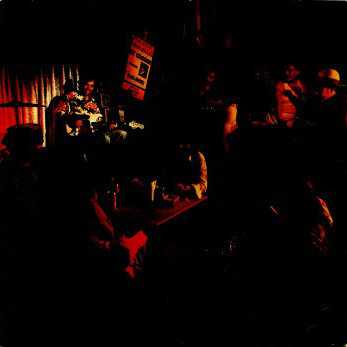 | Album: 7 of 40 Title: Show Time Released: 1977 Tracks: 8 Duration: 43:27 Scroll: Up Down Top Bottom 25% 50% 75% Spotify Allmusic AlbumCover | 1 School Is Out (02:41) 2 Alimony (04:51) 3 Jesus on the Mainline (05:19) 4 The Dark End of the Street (06:31) 5 Viva Seguin / Do Re Mi (05:27) 6 Volver, Volver (03:59) 7 How Can a Poor Man Stand Such Times and Live (06:33) 8 Smack Dab in the Middle (08:01) |
| Show Time : Allmusic album Review : Following the odd, but entertaining Hawaiian, southwestern mix of Chicken Skin Music, Ry Cooder hit the road with a group of Tex-Mex musicians led by the great accordionist Flaco Jiminez. To make things even more interesting, he also included three soul- and gospel-based backup singers in the lineup (two of whom had appeared on Chicken Skin Music). Recorded in December of 1976, over a span of two nights in San Francisco, Show Time documents these shows by Cooder and his "Chicken Skin Revue." And while Cooders guitar -- along with his usual eclectic assortment of songs -- is the star of the show, each of the principles has his chance to shine throughout the evening. Terry Evans, Bobby King, and Eldridge Kings soulful rendition of "The Dark End of the Street," as well as the lovely "Volver, Volver," which features Jiminez, are a couple of the highlights. Cooders selection of material here is as eclectic as ever, but Jiminez and the band stay with him every step of the way. They seem equally at home with the R&B; of "Smack Dab in the Middle" as they do with the Jiminez instrumental "Viva Seguin," which leads into a Tex-Mex reworking of Woody Guthries "Do Re Mi." Still, as good as the fit may be between leader and band, its the Negro spiritual, "Jesus on the Mainline," stripped down to just four voices and Cooders remarkable bottleneck, thats the real showstopper here. Cooder is not usually one to stray too far outside the confines of the song on record, but in this setting he gets a chance to really stretch. Like most live recordings, Show Time isnt necessarily essential, though theres enough to make it worthwhile for fans. Also, included is a terrific Dixieland take on Gary "U.S." Bonds "School Is Out" recorded with the same band in the studio. | ||
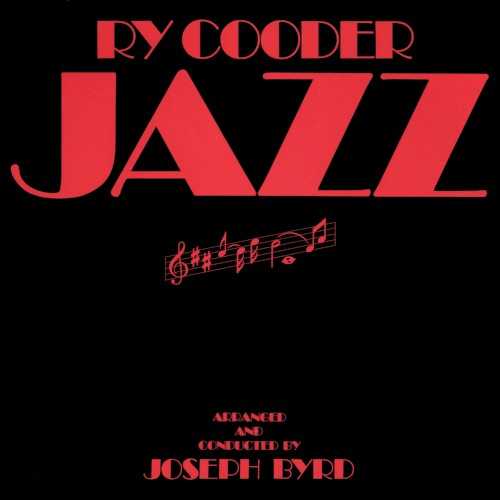 | Album: 8 of 40 Title: Jazz Released: 1978 Tracks: 11 Duration: 38:27 Scroll: Up Down Top Bottom 25% 50% 75% Spotify TrackSamples Allmusic AlbumCover | 1 Big Bad Bill (Is Sweet William Now) (03:36) 2 Face to Face That I Shall Meet Him (03:21) 3 The Pearls / Tia Juana (04:20) 4 The Dream (05:06) 5 Happy Meeting in Glory (03:16) 6 In a Mist (02:09) 7 Flashes (02:19) 8 Davenport Blues (02:05) 9 Shine (03:45) 10 Nobody (05:12) 11 We Shall Be Happy (03:13) |
| Jazz : Allmusic album Review : Beginning with his self-titled debut in 1970, Ry Cooders records seemed to be as much history lesson as they were entertainment. Not because Cooder was trying to club you over the head with this stuff; he simply gravitated to great songs, no matter what the era or genre. Released in 1978, Jazz seems to be his first conscious attempt at a concept album, in the historical sense. Here he pays homage to some of the early tunes and masters of jazz, ranging from the late 1800s through the "coon songs" of the early part of the next century, to the ragtime and "Spanish" music of Jelly Roll Morton, and the sophistication of cornetist Bix Beiderbecke. The only living artist (at the time of release) whos represented here is the great Bahamian guitarist Joseph Spence, who recorded from the 50s through the 80s, and whose syncopated style was extremely influential in Cooders own development as a guitarist. Spences sacred songs are presented here in string and brass band arrangements that emphasize the Caribbean connection between his music and Mortons habaniera pieces. The complexity of the material on Jazz, as well as the arrangements by Joseph Byrd, dictate that this is Cooders most polished and orchestrated effort to date. Whereas in the past, even at their most removed, Cooders records usually kept at least one foot in rock & roll or blues, Jazz can, at times, lack some of that fire and be almost bookish in its approach. Still, there is enough excitement in the musics intricacies and Cooders beautiful, fluid playing to forgive the politeness of some of the performances. From the informative liner notes by Ry Cooder himself to the brilliant compositions, Jazz is, at the very least, educational. But, a little time spent with this music and youll see why it was and continues to be relevant, as well as beloved. | ||
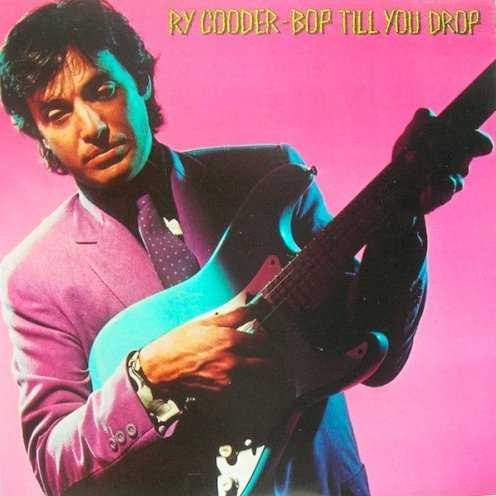 | Album: 9 of 40 Title: Bop Till You Drop Released: 1979-07 Tracks: 9 Duration: 40:28 Scroll: Up Down Top Bottom 25% 50% 75% Spotify TrackSamples Allmusic Wikipedia AlbumCover | 1 Little Sister (03:54) 2 Go Home, Girl (05:15) 3 The Very Thing That Makes You Rich (Makes Me Poor) (05:35) 4 I Think It’s Going to Work Out Fine (04:46) 5 Down in Hollywood (04:21) 6 Look at Granny Run Run (03:14) 7 Trouble, You Can’t Fool Me (04:59) 8 Don’t Mess Up a Good Thing (04:08) 9 I Can’t Win (04:14) |
| Bop Till You Drop : Allmusic album Review : Following his conceptual 1978 release, Jazz, Ry Cooder returned the next year with the R&B;/soul-based Bop Till You Drop. The first major-label, digitally recorded album, Bop is a nice set of moderately known to obscure tunes from the 50s and 60s (along with a Cooder/Tim Drummond original) that doesnt always live up to its promise. Cooder and his excellent band, which includes the rhythm section of Tim Drummond and Jim Keltner along with guitarist David Lindley, understand the material and are more than capable of laying down a decent groove, but something must have gotten lost in translation from what was played to what came across on the recording. Theres a thinness to the tracks that undermines the performances, which according to Cooder is due to the digital recording. If you check out the live version of Bop Till You Drops opener, "Little Sister," from the No Nukes record (using the same band), you can see what surely could have been. Still, Bop is worthwhile given Cooders penchant for choosing great tunes, as well as the tight performances, brilliant guitar work, and a handful of great guest vocalists (including Chaka Khan). A few of the highlights include his arrangement of the early-60s Elvis hit "Little Sister," the soulful "The Very Thing That Makes You Rich (Makes Me Poor)," an instrumental take on Ike & Tina Turners "I Think Its Gonna Work Out Fine," and "I Cant Win," featuring Cooders longtime cohort Bobby King on lead vocal. | ||
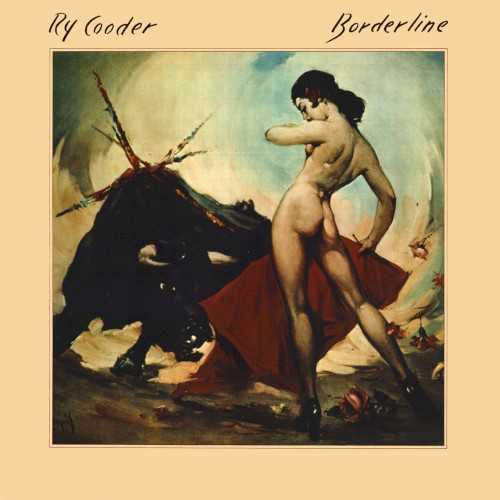 | Album: 10 of 40 Title: Borderline Released: 1980 Tracks: 10 Duration: 44:07 Scroll: Up Down Top Bottom 25% 50% 75% Spotify TrackSamples Allmusic Wikipedia AlbumCover | 1 634-5789 (Soulsville, U.S.A.) (03:01) 2 Speedo (03:23) 3 Why Don’t You Try Me (04:59) 4 Down in the Boondocks (03:24) 5 Johnny Porter (05:22) 6 The Way We Make a Broken Heart (04:32) 7 Crazy ’bout an Automobile (Every Woman I Know) (05:07) 8 The Girls From Texas (04:44) 9 Borderline (03:23) 10 Never Make Your Move Too Soon (06:09) |
| Borderline : Allmusic album Review : With 1980s Borderline, Ry Cooder followed the foray into R&B; and soul of his previous effort, Bop Till You Drop, but this time out with a little shot of the Southwest thrown in. At the same time, he also continues the primarily electric sound of that record. As far as his selection of material goes, Borderline may sometimes lack the surprising, esoteric charm of his earlier recordings, but there are still some terrific finds, including the Tex-Mex-flavored "The Girls from Texas," which may be the albums finest moment. Other highlights include one of John Hiatts best, the written-to-order "The Way We Make a Broken Heart," as well as Billy "The Kid" Emersons "Crazy Bout an Automobile," which Cooder had been performing live for a number of years, and the soulful Maurice & Mac treasure "Why Dont You Try Me." And while its moments like these that help make Cooders records special, he also takes on some better-known 50s and 60s offerings with moderate success. His recording of Wilson Picketts 1966 hit "634-5789" isnt going to make anyone forget the original, but hes able to pull it off as a rocker, while "Speedo" and "Down in the Boondocks" are respectable covers. Borderline may not have the singular personality of his best 70s work, but its a solid outing nonetheless. | ||
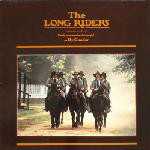 | Album: 11 of 40 Title: The Long Riders Released: 1980-06 Tracks: 13 Duration: 35:40 Scroll: Up Down Top Bottom 25% 50% 75% Allmusic AlbumCover | 1 The Long Riders (03:16) 2 Im a Good Old Rebel (02:19) 3 Seneca Square Dance (02:00) 4 Archies Funeral (Hold to Gods Unchanging Hand) (02:42) 5 I Always Knew That You Were the One (03:08) 6 Rally Round the Flag (04:23) 7 Wildwood Boys (04:15) 8 Better Things to Think About (01:26) 9 Jesse James (02:26) 10 Cole Younger Polka (02:24) 11 Escape From Northfield (01:15) 12 Leaving Missouri (00:59) 13 Jesse James (05:03) |
| The Long Riders : Allmusic album Review : Ry Cooders soundtrack for The Long Riders received a top-notch treatment from Warner Bros. (Japan), who not only did an excellent remastering job, but backed it up with English lyrics to the songs, notes, and a Japanese insert. Cooder was in fine form with this score, using original material, unusual and anachronistic instruments (saz, tamboura, electric guitar), and elements of traditional songs from the Civil War period. As a result, the album can be appreciated as a unique entity, away from the film -- and bonded to the film, the music provides grace and power to the onscreen events. | ||
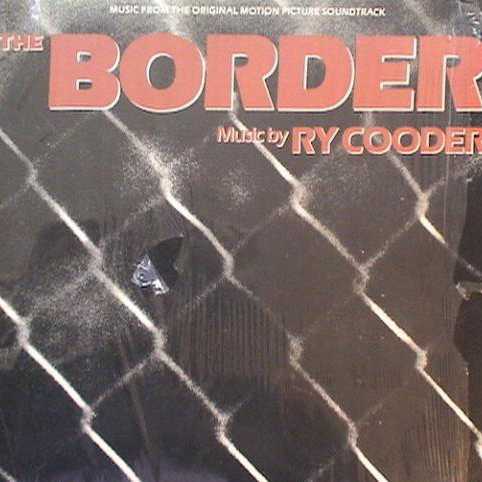 | Album: 12 of 40 Title: The Border Released: 1982 Tracks: 13 Duration: 33:40 Scroll: Up Down Top Bottom 25% 50% 75% AlbumCover | 1 Earthquake (01:03) 2 Across the Borderline (02:56) 3 Maria (01:09) 4 Texas Bop (02:25) 5 Highway 23 (01:56) 6 Palomita (02:50) 7 Rio Grande (01:49) 8 Too Late (03:12) 9 No Quiero (02:43) 10 Skin Game (06:08) 11 El Scorcho (01:14) 12 Building Fires (04:21) 13 Niño (01:49) |
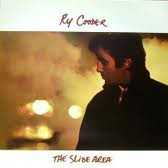 | Album: 13 of 40 Title: The Slide Area Released: 1982 Tracks: 8 Duration: 39:18 Scroll: Up Down Top Bottom 25% 50% 75% Spotify Allmusic AlbumCover | 1 UFO Has Landed in the Ghetto (05:03) 2 I Need a Woman (04:37) 3 Gypsy Woman (04:04) 4 Blue Suede Shoes (05:21) 5 Mama, Dont Treat Your Daughter Mean (05:59) 6 Im Drinking Again (04:38) 7 Which Came First (03:46) 8 Thats the Way Love Turned Out for Me (05:47) |
| The Slide Area : Allmusic album Review : This CD opens with an outrageous and exceedingly funky "UFO Has Landed in the Ghetto," and which seems so out of place with the other material. Yes, it is a rhythm & blues, bordering at times on funk album, and rap is one direction R&B; took, but.... Listen to the groove on "Which Came First," and try to keep your body from bobbing to the strong rhythm laid down by Jim Keltner, Tim Drummond, and the background vocalists. While we are on the subject of vocals, this is one of Ry Cooders best efforts, and his backup vocalists are key here and deserve special recognition: Bobby King, John Hiatt, Willie Greene, and Herman Johnson for most of the CD. The two gems on this are the phenomenal treatments of both "Blue Suede Shoes" and Bob Dylans "I Need a Woman." Two songs as different in the original forms as pigs and gerbils are converted to R&B; hit status. Both contain some memorable slide guitar work, but isnt that what we expect from this master of the guitar family. The album is very good but those two songs make it a gem. | ||
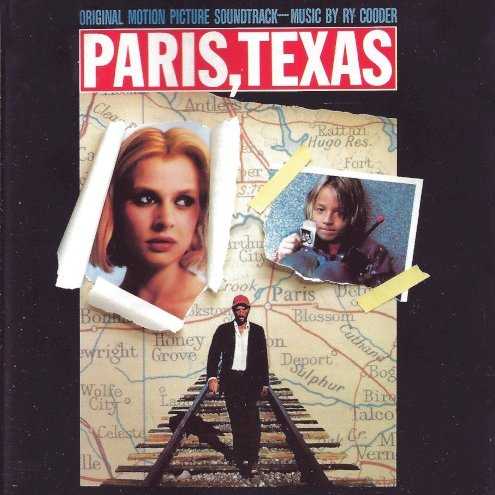 | Album: 14 of 40 Title: Paris, Texas Released: 1985 Tracks: 10 Duration: 34:11 Scroll: Up Down Top Bottom 25% 50% 75% AlbumCover | 1 Paris, Texas (02:57) 2 Brothers (02:07) 3 Nothing Out There (01:35) 4 Canción Mixteca (04:17) 5 No Safety Zone (01:55) 6 Houston in Two Seconds (02:07) 7 Shes Leaving the Bank (06:02) 8 On the Couch (01:32) 9 I Knew These People (08:43) 10 Dark Was the Night (02:52) |
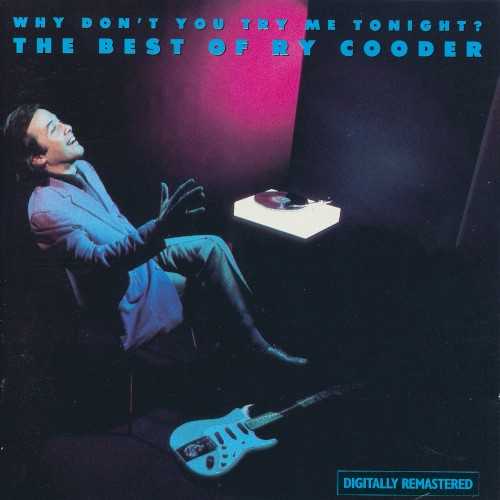 | Album: 15 of 40 Title: Why Dont You Try Me Tonight: The Best of Ry Cooder Released: 1985 Tracks: 13 Duration: 50:39 Scroll: Up Down Top Bottom 25% 50% 75% Allmusic AlbumCover | 1 How Can a Poor Man Stand Such Times and Live? (02:45) 2 Available Space (02:14) 3 Money Honey (03:29) 4 Tattler (04:17) 5 Hell Have to Go (05:09) 6 Smack Dab in the Middle (03:19) 7 Dark End of the Street (03:26) 8 Down in Hollywood (04:18) 9 Little Sister (03:47) 10 I Think Its Gonna Work Out Fine (04:45) 11 Crazy bout an Automobile (Every Woman I Know) (05:08) 12 634-5789 (03:00) 13 Why Dont You Try Me (04:55) |
| Why Don't You Try Me Tonight: The Best of Ry Cooder : Allmusic album Review : This compilation offers a bakers dozen from Ry Cooder (guitar/bass/mandolin/vocals), cuts taken from seven of the eight solo studio LPs that he issued between 1970 and 1980. These include his debut Ry Cooder (1970), Into the Purple Valley (1971), Boomers Story (1972), Paradise and Lunch (1974), Chicken Skin Music (1976), Bop Till You Drop (1979), and Borderline (1980). Notably absent, owing presumably to thematic continuity, are any soundtrack-derived sides, live cuts, or material from the aptly-titled Jazz (1978) long-player. This nicely narrows the scope enough to effectively focus on his arguably underappreciated rock-oriented recordings. Few artists can claim as varied or authentic a range as the multi-instrumentalist Cooder. Prior to devoting a majority of his efforts toward film accompaniment and world music, he came up through the ranks as a backing for vocalist Jackie DeShannon in 1963 at the age of 16. Cooders prowess became his calling card where he racked up considerable work with the likes of Paul Revere and the Raiders, Captain Beefheart circa Safe as Milk (1967), Randy Newman, Little Feat, Van Dyke Parks, former bandmate in the Rising Sons Taj Mahal, Gordon Lightfoot, as well as a few choice outings with a transitional Rolling Stones on Let It Bleed (1969) and Sticky Fingers (1971). In fact, it was between the latter two classic rock platters that the eponymous Ry Cooder immediately established the seasoned session stalwart with his undeniable talent and keen taste in cover material. The soulful reading of Blind Alfred Reeds "How Can a Poor Man Stand Such Times and Live?" and the bluesy, Delta-flavored original, "Available Space," perfectly demonstrate his multitude of strengths. Remaining at the top of the list are Cooders consistently unique rearrangements of seminal R&B; sides, such as his overhaul of "Money Honey," or the laid-back and funky "Smack Dab in the Middle." Since the release of Why Dont You Try Me Tonight: Best of Ry Cooder (1986), several additional and more complete anthologies spanning this era are available. Most notably, River Rescue: The Very Best of Ry Cooder (1994), and Music by Ry Cooder (1995), which both feature cinematic contributions. In fact, the latter consists exclusively of Cooders movie music. | ||
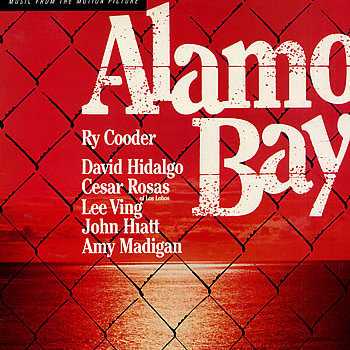 | Album: 16 of 40 Title: Alamo Bay Released: 1985 Tracks: 9 Duration: 34:59 Scroll: Up Down Top Bottom 25% 50% 75% Allmusic AlbumCover | 1 Theme From Alamo Bay (05:07) 2 Gooks On Main Street (03:53) 3 Too Close (03:23) 4 Klan Meeting (02:46) 5 Sailfish Evening (03:59) 6 The Last Stand [Alamo Bay] (02:59) 7 Quatro Vicios (03:29) 8 Search And Destroy (05:07) 9 Glory (04:16) |
| Alamo Bay : Allmusic album Review : One of Cooders better film scores, though the picture itself vanished into obscurity. Five of the nine pieces are instrumental, and Cooder flavors his distinctly trembling blues guitar with shakuhachi and violin to create moody pieces evoking spare and desolate landscapes that owe as much to the tropics and the desert as the Delta. Also has some routine bar-band blues-rock songs, a country duet between John Hiatt and actress Amy Madigan, and cameo appearances by David Lindley, David Hidalgo and Cesar Rosas of Los Lobos, and Fear vocalist Lee Ving. | ||
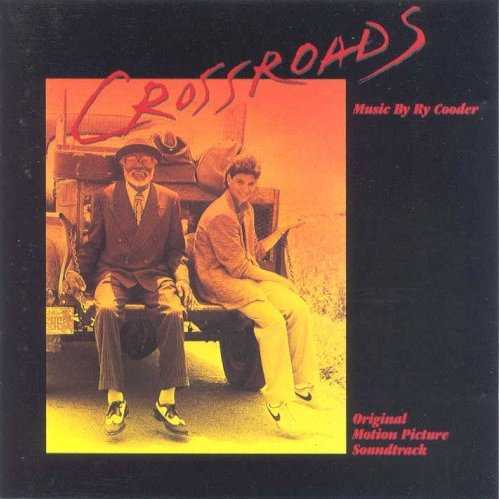 | Album: 17 of 40 Title: Crossroads Released: 1986 Tracks: 11 Duration: 37:45 Scroll: Up Down Top Bottom 25% 50% 75% Spotify Allmusic AlbumCover | 1 Crossroads (04:24) 2 Down in Mississippi (04:25) 3 Cotton Needs Pickin (02:58) 4 Viola Lee Blues (03:11) 5 See You in Hell, Blind Boy (02:10) 6 Nitty Gritty Mississippi (02:57) 7 He Made a Woman Out of Me (04:12) 8 Feelin Bad Blues (04:16) 9 Somebodys Callin My Name (01:45) 10 Willie Brown Blues (03:45) 11 Walkin Away Blues (03:37) |
| Crossroads : Allmusic album Review : The ersatz blues story of the film gives Ry Cooder leeway to turn in an impressive blues-derived soundtrack featuring Sonny Terry along with his usual collaborators Van Dyke Parks, Jim Keltner, Nathan East, and others. But its Cooders guitar playing that highlights the album. | ||
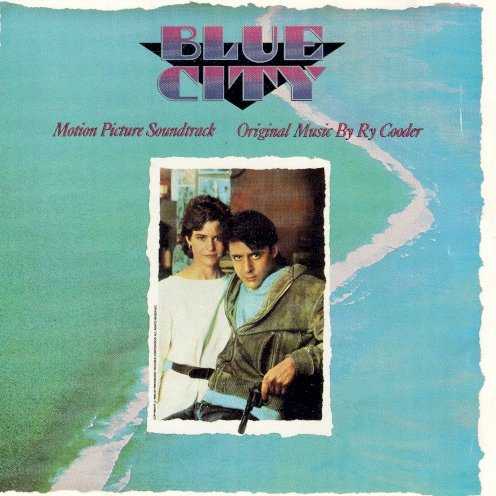 | Album: 18 of 40 Title: Blue City Released: 1986-05 Tracks: 11 Duration: 35:22 Scroll: Up Down Top Bottom 25% 50% 75% Allmusic AlbumCover | 1 Blue City Down (03:29) 2 Elevation 13 ft. (03:18) 3 Marianne (02:59) 4 Nice Bike (01:36) 5 Greenhouse (04:18) 6 Billy and Annie (02:46) 7 Pops and Timer (Tell Me Something Slick) (02:50) 8 Blue City (04:21) 9 Dont Take Your Guns to Town (03:48) 10 A Leader of Men (01:24) 11 Not Even Key West (04:30) |
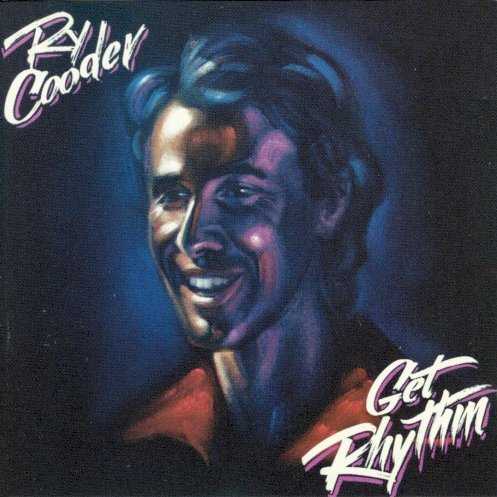 | Album: 19 of 40 Title: Get Rhythm Released: 1987 Tracks: 9 Duration: 40:53 Scroll: Up Down Top Bottom 25% 50% 75% Spotify Allmusic Wikipedia AlbumCover | 1 Get Rhythm (03:17) 2 Low-Commotion (03:09) 3 Going Back to Okinawa (04:42) 4 13 Question Method (03:39) 5 Women Will Rule the World (05:51) 6 All Shook Up (03:30) 7 I Can Tell by the Way You Smell (04:33) 8 Across the Borderline (06:17) 9 Lets Have a Ball (05:50) |
| Get Rhythm : Allmusic album Review : "The Musicians Musician." "The Master of the Eclectic." There are probably a dozen more titles by which this "guitar player" is known. To even refer to him as a guitar player is probably a gross mislabeling of this musician. He defies any sort of categorization; this is his greatest strength and for some his weakness. The theme for these nine cuts is rhythm of all different ilk. I wont even give the parameters because he seems to have none. I wondered how many different instruments he played on this album (I thought I counted five different types of guitar); it only says guitar and vocal for his credits. Listen to his version of "All Shook Up," more bop and rhythm than Elvis could put into four of his songs. It seems musicians line up to play with him, and they feel he did them a favor by letting them play on his albums. He always gives them plenty of space to do what they do. This CD will make the dead start tapping their toes. | ||
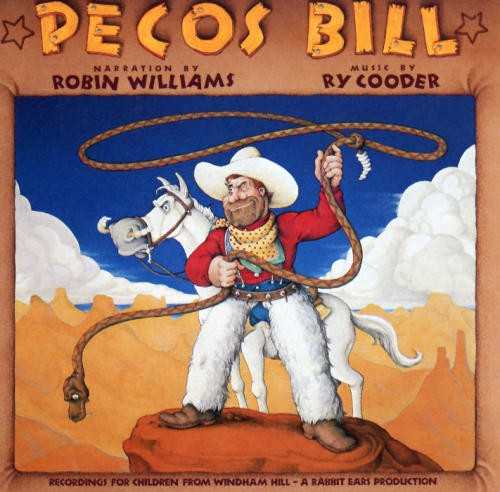 | Album: 20 of 40 Title: Pecos Bill Released: 1988 Tracks: 5 Duration: 33:04 Scroll: Up Down Top Bottom 25% 50% 75% AlbumCover | 1 Pecos Bill (Part I & II) (24:16) 2 Pecos Bill (02:07) 3 Prettiest Girl in the World (02:05) 4 Up and Up They Went (02:59) 5 A Cowboys Prayer (01:37) |
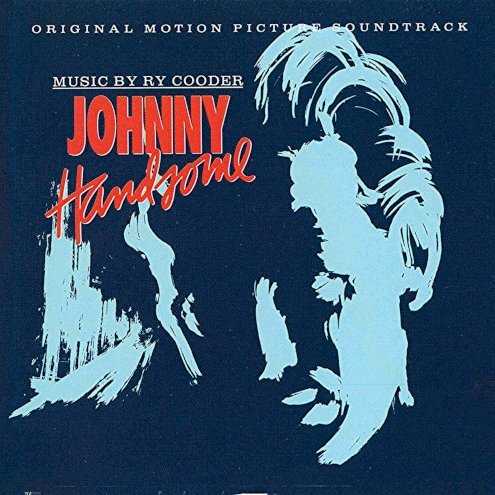 | Album: 21 of 40 Title: Johnny Handsome Released: 1989-09 Tracks: 16 Duration: 41:42 Scroll: Up Down Top Bottom 25% 50% 75% Allmusic AlbumCover | 1 Main Theme (01:54) 2 I Cant Walk This Time (06:50) 3 Angola (02:02) 4 Clip Joint Rhumba (03:18) 5 Sad Story (02:37) 6 Fountain Walk (02:18) 7 Cajun Metal (02:01) 8 First Week at Work (01:06) 9 Greasy Oysters (01:54) 10 Smells Like Money (02:28) 11 Sunnys Tune (02:56) 12 I Like Your Eyes (02:24) 13 Adios Donna (01:35) 14 Cruising with Rafe (03:02) 15 Hows My Face (01:51) 16 End Theme (03:18) |
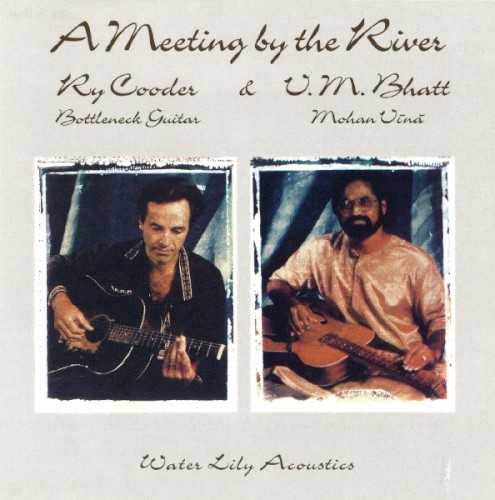 | Album: 22 of 40 Title: A Meeting by the River Released: 1993 Tracks: 4 Duration: 39:45 Scroll: Up Down Top Bottom 25% 50% 75% Allmusic Wikipedia AlbumCover | 1 A Meeting by the River (10:07) 2 Longing (11:59) 3 Ganges Delta Blues (09:59) 4 Isa Lei (07:39) |
| A Meeting by the River : Allmusic album Review : A Meeting by the River can best be described as a spontaneous outpouring of music, unhindered by convention or form, brought into being by musicians so supremely capable that the music is never labored, the technique of their craft always subservient to the final product. Cooder and Bhatt are genuine masters of the guitar and mohan vina, respectively. The latter, an instrument created by Bhatt himself, is a sort of hybrid between a guitar and a vichitra vina, and is played with a metal slide. This fact is just one of the many things that connect Bhatts playing to Cooders, who plays nothing but bottleneck guitar here. The musical interplay between Cooder and Bhatt is nothing short of astounding, especially so considering that they met for the first time only a half-hour before the recording of this album. The voices of the two instruments blend marvelously, first alternating melodic statements, then doing so together, each dancing around the other, playing cat and mouse, probing, answering, reflecting. They are ably accompanied by a pair of percussionists: tabla player Sukhvinder Singh Namdhari and Cooders own son, Joachim, on dumbek. A Meeting by the River is one of those few cross-genre albums in which the listener never feels for a second that there is some kind of fusion going on; one does not hear the component parts so much as the integrated whole. However, one can theoretically separate guitar from vina, America from India, the Mississippi from the Ganges. Once this is done, the resulting music makes more sense than ever before, the combination of two traditions of stringed instruments that use slides to produce sound and value improvisation and voice-like phrasing. As good as this sounds on paper, the actual results are even more impressive. The splendor of the music is aided in its transmission by the fact that, like all Water Lily Acoustics releases, this album is masterfully recorded; each instrument is clear, distinct, and three-dimensional sounding. A Meeting by the River is a must-own, a thing of pure, unadulterated beauty, and the strongest record in Cooders extensive catalog. | ||
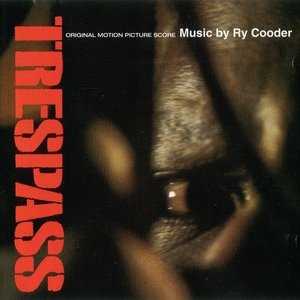 | Album: 23 of 40 Title: Trespass Released: 1993 Tracks: 14 Duration: 37:27 Scroll: Up Down Top Bottom 25% 50% 75% Allmusic AlbumCover | 1 Video Drive-By (01:55) 2 Trespass (Main Title) (01:38) 3 East St. Louis (02:01) 4 Orgill Bros. (01:44) 5 Goose and Lucky (03:27) 6 You Think Its on Now (01:41) 7 Solid Gold (00:58) 8 Heroin (04:13) 9 Totally Boxed In (06:48) 10 Give em Cops (02:06) 11 Lucy in the Trunk (01:27) 12 Were Rich (02:26) 13 King of the Street (03:59) 14 Party Lights (03:00) |
| Trespass : Allmusic album Review : Cooders underscore for Trespass, performed with the help of drummer Jim Keltner and trumpeter Jon Hassell, is a moody, dark piece of work quite a bit removed from Cooders usual territory -- Cooder has taken experimental jazz as a main influence here, mixing that with tones available from modern instruments and studio processing. The result is edgy and grim, so effective that even at low volume the music comes snarling at you. | ||
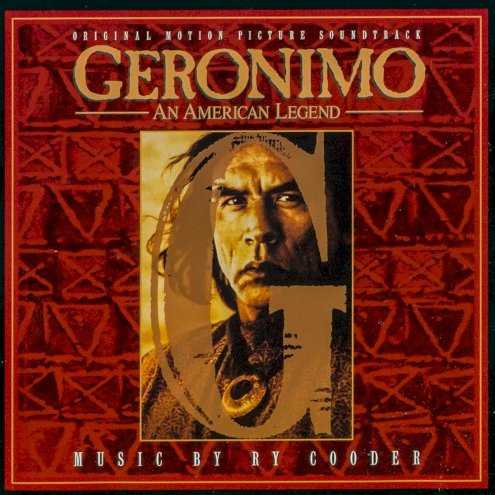 | Album: 24 of 40 Title: Geronimo: An American Legend Released: 1993-12-14 Tracks: 17 Duration: 1:00:03 Scroll: Up Down Top Bottom 25% 50% 75% Allmusic AlbumCover | 1 Geronimo: Main Title (05:08) 2 Restoration (06:19) 3 Goyakla Is Coming (01:11) 4 Bound for Canaan (The 6th Cavalry) (01:37) 5 Cibeue (02:02) 6 The Governors Ball: Get Off the Track / Danza / Battle Cry of Freedom (09:43) 7 Wayfaring Stranger (03:08) 8 Judgement Day (02:11) 9 Bound for Canaan (Sieber & Davis) (01:30) 10 Embudos (01:55) 11 Sand Fight (01:13) 12 Army Brass Band: The Young Recruit / The Girl I Left Behind Me / Come Come Away (02:57) 13 Yaqui Village (03:17) 14 I Have Seen My Power (02:15) 15 La Vista (03:10) 16 Davis (02:52) 17 Train to Florida (09:27) |
| Geronimo: An American Legend : Allmusic album Review : Director Walter Hill hired Ry Cooder to do the score for a movie he describes on the back cover as "a drama about two cultures," and Cooder (with such cronies as David Lindley and R. Carlos Nakai) has delivered an appropriate mixture of sounds identifiably based in Native American music and in nineteenth century American folk music--music for the campfires of both camps, as it were. Cooder is steeped in such styles, and the result is effective, if not one of his more independent scores. | ||
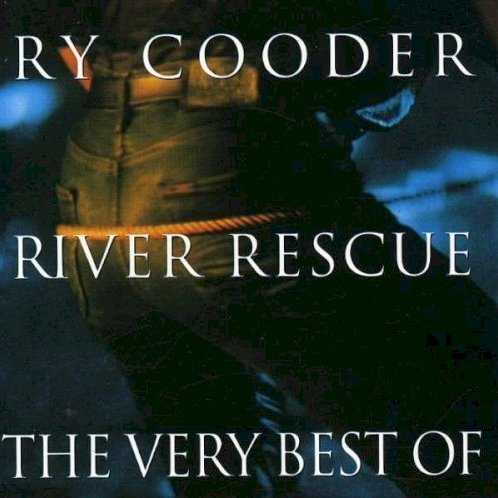 | Album: 25 of 40 Title: River Rescue: The Very Best of Ry Cooder Released: 1994 Tracks: 19 Duration: 1:17:34 Scroll: Up Down Top Bottom 25% 50% 75% Allmusic AlbumCover | 1 River Come Down (PKA Bamboo) (04:14) 2 UFO Has Landed in the Ghetto (05:03) 3 Low-Commotion (03:09) 4 Smack Dab in the Middle (03:19) 5 Tattler (04:19) 6 Dark End of the Street (03:27) 7 The Very Thing that Makes You Rich (Makes Me Poor) (05:31) 8 Going Back to Okinawa (04:42) 9 Money Honey (03:29) 10 Why Dont You Try Me (04:55) 11 Paris, Texas (02:56) 12 Chloe (03:04) 13 The Pearls / Tia Juana (04:20) 14 I Think It’s Going to Work Out Fine (04:46) 15 Down in Hollywood (04:18) 16 Which Came First (03:46) 17 Crazy bout an Automobile (Every Woman I Know) (05:02) 18 Get Rhythm (03:17) 19 Little Sister (03:47) |
| River Rescue: The Very Best of Ry Cooder : Allmusic album Review : Guitarist Ry Cooder is probably best known for his moody film soundtracks and his collaborations with world musicians V.M. Bhatt and Ali Farka Toure, which get frequent airplay on National Public Radio, or perhaps his performance and production work with Cubas Buena Vista Social Club. But between these higher-profile gigs and his debut as a teenage guitar whiz alongside the eccentric Captain Beefheart, Cooder recorded a series of solo albums for Warner Bros.. Some were better than others, owing to their stars reedy voice and spotty writing talents, but all had their share of good moments. A European import, River Rescue: The Very Best of Ry Cooder is a generous collection of highlights from those albums, with one new tune, "River Come Down (PKA Bamboo)," that reflects his interests in cross-cultural collaboration. The older album tunes tend to fall into one of two categories: R&B; ("Dark End of the Street" and "Money Honey") or weird experiments, such as George Clinton-inspired funk ("UFO Has Landed in the Ghetto") and Hawaiian swing ("Chloe"). Sometimes Cooder sounds as if he would give anything to be Little Feats Lowell George; sometimes he sounds as if he might disappear with his guitar into the song hes playing. An interesting introduction to an earnest musician whose chameleon-like qualities work against him just about as often as they work. | ||
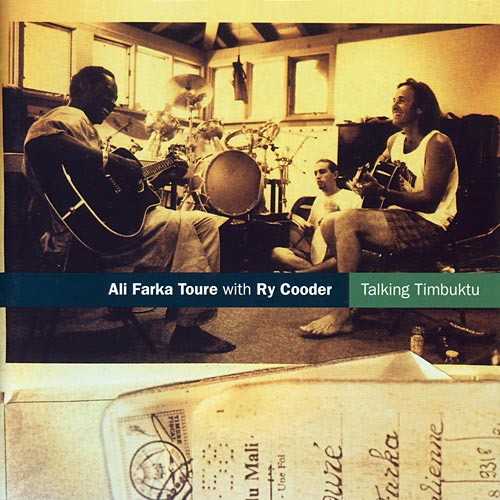 | Album: 26 of 40 Title: Talking Timbuktu Released: 1994-03-28 Tracks: 10 Duration: 1:00:03 Scroll: Up Down Top Bottom 25% 50% 75% Spotify Allmusic Wikipedia AlbumCover | 1 Bonde (05:28) 2 Soukora (06:04) 3 Gomni (07:00) 4 Sega (03:10) 5 Amandrai (09:22) 6 Lasidan (06:06) 7 Keito (05:42) 8 Banga (02:32) 9 Ai Du (07:08) 10 Diaraby (07:25) |
| Talking Timbuktu : Allmusic album Review : Guitarist Ali Farka Touré has repeatedly bridged the gap between traditional African and contemporary American vernacular music, and this release continues that tradition. Talking Timbuktu features him singing in 11 languages and playing acoustic and electric guitar, six-string banjo, njarka, and percussion, while teaming smartly with an all-star cast that includes superstar fusion bassist John Patitucci, session drummer Jim Keltner, longtime roots music great Ry Cooder (who doubled as producer), venerable guitarist Gatemouth Brown, and such African percussionists and musicians as Hamma Sankare on calabash and Oumar Touré on congas. | ||
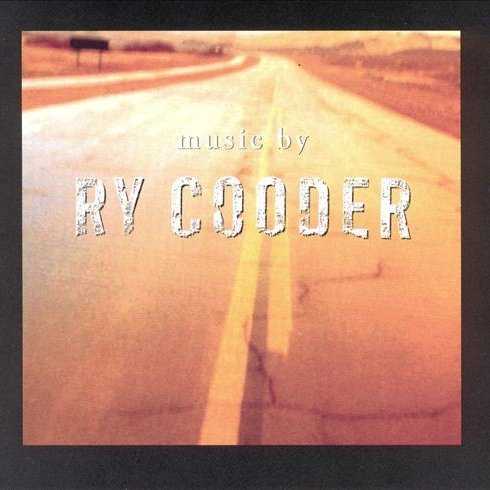 | Album: 27 of 40 Title: Music by Ry Cooder Released: 1995-07-11 Tracks: 34 Duration: 1:42:27 Scroll: Up Down Top Bottom 25% 50% 75% Spotify Allmusic AlbumCover | 1 Paris, Texas (02:56) 2 Theme From Southern Comfort (03:47) 3 Theme From Alamo Bay (05:09) 4 Across the Borderline (03:05) 5 Highway 23 (01:56) 6 Bomber Bash (04:02) 7 Greenhouse (03:38) 8 Nice Bike (01:35) 9 I Like Your Eyes (02:25) 10 Main Theme (01:54) 11 See You in Hell, Blind Boy (02:10) 12 Feelin Bad Blues (04:16) 13 Swamp Walk (01:04) 14 Angola (02:02) 15 Viola Lee Blues (03:10) 16 The Long Riders (03:16) 17 Archies Funeral (Hold to Gods Unchanging Hand) (02:42) 18 Jesse James (05:05) 1 King of the Street (03:58) 2 Sunnys Tune (02:56) 3 No Quiero (02:45) 4 Cruising With Rafe (03:02) 5 Klan Meeting (02:48) 6 I Cant Walk This Time / The Prestige (06:50) 7 East St. Louis (02:03) 8 Goose and Lucky (01:40) 9 Goyakla Is Coming (01:10) 10 Canoes Upstream (01:09) 11 Canción Mixteca (04:16) 12 Maria (00:51) 13 Bound for Canaan (Sieber & Davis) (01:28) 14 Bound for Canaan (The 6th Calvary) (01:36) 15 Train to Florida (09:27) 16 Houston in Two Seconds (02:01) |
| Music by Ry Cooder : Allmusic album Review : Since hes a limited vocalist with erratic songwriting skills, one could justifiably argue that the soundtrack medium is the best vehicle for Ry Cooders talents, allowing him to construct eclectic, chiefly instrumental pieces drawing upon all sorts of roots music and ethnic flavors (often, but not always, employing his excellent blues and slide guitar). This two-CD, 34-song compilation gathers excerpts from 11 of the soundtracks he worked on between 1980 and 1993 (three of the cuts, from the 1981 film Southern Comfort, are previously unreleased). As few listeners (even Cooder fans) are dedicated enough to go to the trouble of finding all of his individual soundtracks, this is a good distillation of many of his more notable contributions in this idiom, although it inevitably leaves out some fine moments. Still, its well programmed and evocative, often conjuring visions of ghostly landscapes and funky border towns. | ||
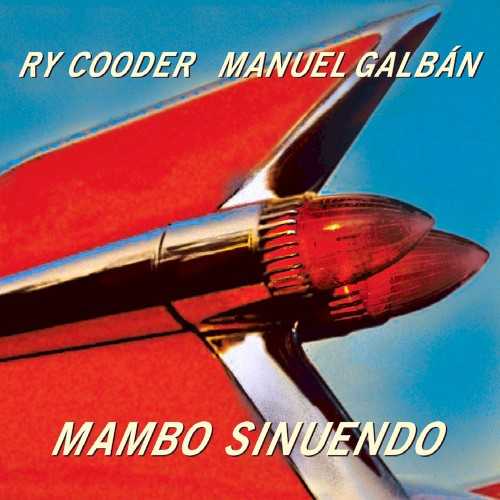 | Album: 28 of 40 Title: Mambo sinuendo Released: 2003-01-28 Tracks: 12 Duration: 50:29 Scroll: Up Down Top Bottom 25% 50% 75% Spotify Wikipedia Allmusic AlbumCover | 1 Drume negrita (05:00) 2 Monte adentro (02:53) 3 Los twangueros (04:42) 4 Patricia (03:29) 5 Caballo viejo (03:51) 6 Mambo sinuendo (02:31) 7 Bodas de oro (04:40) 8 Échale salsita (04:27) 9 La luna en tu mirada (04:13) 10 Secret Love (05:49) 11 Bolero sonámbulo (04:31) 12 María la o (04:19) |
| Mambo sinuendo : Allmusic album Review : Mambo Sinuendo is a collaboration between Ry Cooder and Buena Vista alum (and formerly of many other groups as well) Manuel Galbán. The album attempts to catch an old style popularized in Cuba by Galbán, and was, surprisingly, never followed up on by anybody after Galbán. Its a guitar-based romp closely based in the pop/jazz crossovers of the 1950s-1960s (Henry Mancini, Nelson Riddle, etc). Theres a touch of exoticism here and there, and a larger touch of a relatively Hawaiian feel throughout the whole via the guitar techniques employed by the pair. Its all somewhere in a form between lounge, mambo, and Esquivels old space-age-bachelor-pad music. In rare instances, theres even a little bit of a house drum loop added in by the percussionists. Aside from the stray spacey chorus in the title track, its an entirely instrumental affair, which suits the musicians quite well, giving them a chance to show off their full virtuosity along the way. The musicality these guitarists hold, and the interplay between them, is really the treat of the album. For a nice look at the musical genre that never was, but probably should have been, this makes a good show. Newcomers to Cooder should perhaps dig into some older releases to get a feel before coming to this album, but all others should embrace it quickly. | ||
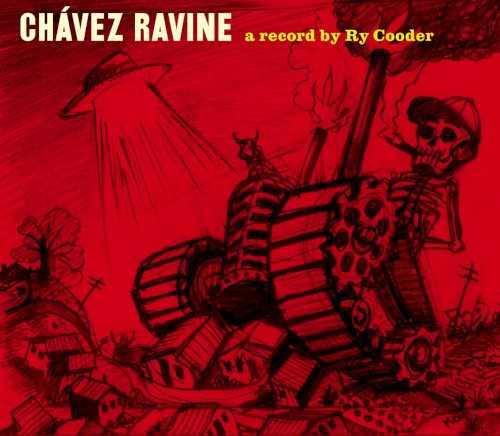 | Album: 29 of 40 Title: Chávez Ravine Released: 2005-06-14 Tracks: 15 Duration: 1:10:06 Scroll: Up Down Top Bottom 25% 50% 75% Spotify TrackSamples Allmusic Wikipedia AlbumCover | 1 Poor Mans Shangri-La (05:29) 2 Onda Callejera (03:54) 3 Dont Call Me Red (05:00) 4 Corrido de Boxeo (03:23) 5 Muy Fifí (04:05) 6 Los Chucos Suaves (03:10) 7 Chinito Chinito (04:52) 8 3 Cool Cats (03:00) 9 El U.F.O. Cayó (08:24) 10 Its Just Work for Me (05:58) 11 In My Town (05:42) 12 Ejercito Militar (03:18) 13 Barrio Viejo (04:45) 14 3rd Base, Dodger Stadium (05:45) 15 Soy Luz Y Sombra (03:14) |
| Chávez Ravine : Allmusic album Review : Three years in the making, Chavez Ravine: A Record by Ry Cooder, is his first "solo" offering since 1987s Get Rhythm. In addition, it is a concept album; but dont be afraid. It documents in mythical style the disappeared Los Angeles neighborhood of Chavez Ravine, a Mexican-American district that fought over by real etate developers, urban planning activists and city government. It was bulldozed in a sleazy deal was cut and it was razed order to erect a stadium that woiuld lure Walter OMalleys Brooklyn Dodgers to L.A. Cooders work has almost always concerned itself with what has been left out, marginalized, or relegated to the place of memory; it was inspired by a book of black-and-white photographs of the area by Don Normark. Over the course of its 15 songs Cooder poignantly, yet warmly, sets out to portray the flavor of the place, times, culture, chaos, and corruption of post-war Los Angeles. Here UFOs, the Red Scare, the Pachuco Scare, boxers, cops, hipster "cool cats," ordinary folks, race politics, class war, the radio, J. Edgar Hoover, baseball, and of course musicians, slip in and out of this steamy, dreamy, seamless mix that evokes an emotional palette rich and complex. The tunes range from boxy corridos, Latin swing numbers, guarachas, Afro-Cuban sons, smoky polkas, moody atmospheric pieces, riotous good-time Pachuco boogie, rootsy rock, Costa Rican folk songs, and R&B; tunes. Heroes and villains come and go in this panorama, all winding around in the little neighborhood where people hang out, sing, dance, make love, struggle and sweat for a better life in the American Dream. Sung in Spanish and English, Cooder sought out musicians from the era and the place, including the late Pachuco boogie boss Don Tosti, the late legendary Lalo Guerrero (the guiding force and spirit of the album who also passed away after contributing), Ersi Arvizu, and Little Willie G., all of whom appear with Joachim Cooder, Juliette & Carla Commagere, Jim Keltner, Flaco Jimenez, Mike Elizondo, Gil Bernal, Ledward Kaapana, Joe Rotunde, Rosella Arvizu, and others. "Poor Mans Shangri-La," is a finger-popping rhumba where the extraterrestrial Space Vato beams down in a UFO to check out the hood to the sounds of Little Julian Herrera on the radio. Little Willie G. and the Commagere Sisters offer the lilting "Onda Calljera," a folk song documenting a war between locally stationed military and pachucos. Chavez Ravine is an intricately woven web of covers including "3 Cool Cats," by Leiber & Stoller, Guerreros "Corrido de Boxeo" and "Barrio Viejo," and originals like the cinematic "Dont Call Me Red" (where the taped voices of Frank Wilkinson, Jack Webb, and Raymond Burr all dialogue intensely about the FBI and communist activities) and "3rd Base, Dodger Stadium," sung by longtime Cooder mate James Bla Pahinui -- who plays the part of a stadium car parker whose home was covered over by the hot corner in the ballpark. Chavez Ravine is sad and beautiful, funny, quirky and funky; its got dirt under its nails and keeps listeners engaged from the jump with history and its colorful ghosts. Cooder sends it all off with solace, and perhaps with some hope, in a version of "Soy Luz y Sombra," a gorgeous a cappella Costa Rican folk tune with original music. Chavez Ravine is easily the most ambitious thing in Cooders catalog, and it just may be the grand opus of his career. | ||
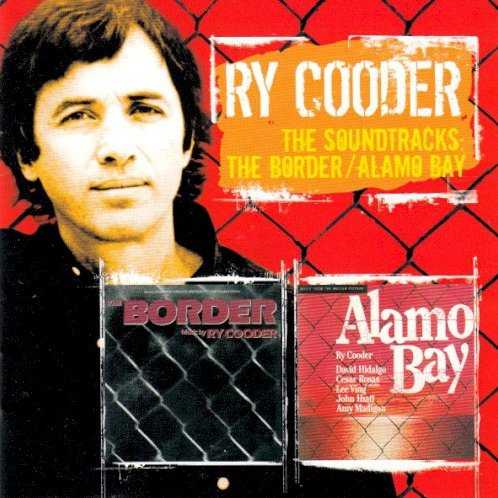 | Album: 30 of 40 Title: The Soundtracks: The Border / Alamo Bay Released: 2006 Tracks: 22 Duration: 1:08:39 Scroll: Up Down Top Bottom 25% 50% 75% Allmusic AlbumCover | 1 Earthquake (01:03) 2 Across the Borderline (02:56) 3 Maria (01:09) 4 Texas Bop (02:25) 5 Highway 23 (01:56) 6 Palomita (02:50) 7 Rio Grande (01:49) 8 Too Late (03:12) 9 No Quiero (02:43) 10 Skin Game (06:08) 11 El Scorcho (01:14) 12 Building Fires (04:21) 13 Niño (01:49) 14 Theme From Alamo Bay (05:07) 15 Gooks On Main Street (03:53) 16 Too Close (03:23) 17 Klan Meeting (02:46) 18 Sailfish Evening (03:59) 19 The Last Stand [Alamo Bay] (02:59) 20 Quatro Vicios (03:29) 21 Search And Destroy (05:07) 22 Glory (04:16) |
| The Soundtracks: The Border / Alamo Bay : Allmusic album Review : The folks at Raven Records in Australia must have a blast assembling projects. This pairing of two 1980s Ry Cooder soundtracks is a case in point. The Border, composed and released in 1982, was the soundtrack to Tony Richardsons film The Border, and 1985s Alamo Bay was directed by Louis Malle. The interesting thing about these soundtracks is that they come immediately after Cooders successful collaboration with Walter Hill on The Long Riders and Southern Comfort, and as the before-and-after bookends to his enigmatic score for Wim Wenders Paris, Texas. The score for The Border is perfectly balanced. Cooders slide work is always touted, but also noteworthy is his ability to virtually disappear in the mix when collaborating with Flaco Jimenez, Freddy Fender, Jim Dickinson, Jim Keltner, and Sam "The Sham" Samudio. The haunting title track, "Across the Borderline," sung by Fender, is among the most beautiful and literate cuts Cooder has ever written. The cantina music by Jimenez and Samudio is utterly evocative. Check the tunes with Samudio on vocals, such as "Palomita" and "No Quiero," to get the laid-back, sun-up feel. Then theres John Hiatt. Hiatt was at the beginning of his association with Cooder. He helped to pen some of the better cuts on the set, including the aforementioned "Across the Borderline" and the bluesy garage rock jam "Skin Game." His high-whine vocals are perfect for the tension between cultures and reflect the conflict of Jack Nicholsons character as a principled U.S. border guard. Alamo Bay, Malles picture that pits American shrimpers against refugee Vietnamese on the south coast of Texas, is another study in contrasts. Once more, Cooder assembles an all-star band that includes Hiatt, Cesar Rosas, David Hidalgo, Lee Ving, Van Dyke Parks, David Lindley, Keltner, Chris Ethridge, David Mansfield, and Dickinson. The theme features Cooders acoustic slide amidst strings (including Gayle Levants harp), piano, and ambient sounds. The ethereal airy feel is swallowed whole by the raunchy electric roadhouse blues of "Gooks on Main Street," and dislocated once more on the country ballad "Too Close," performed by Hiatt with actress Amy Madigan, only to shift again with the sinister slide guitar and harmonica Eastern modal blues of "Klan Meeting," an instrumental. The score weaves and wends through barroom shouters, panoramic instrumentals, ballads, Tex Mex, and conjunto. Placing both recordings on a single disc is a rare and exotic treat, and gives great insight into the complex yet visionary artist Cooder is, and just how his music is the perfect accompaniment to visuals yet stands completely on its own. | ||
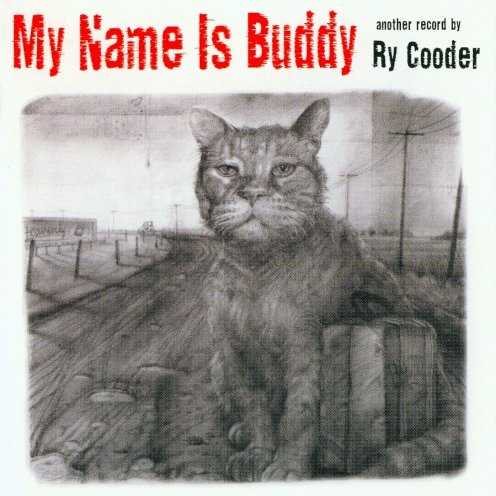 | Album: 31 of 40 Title: My Name Is Buddy Released: 2007-03-06 Tracks: 17 Duration: 1:10:50 Scroll: Up Down Top Bottom 25% 50% 75% Spotify TrackSamples Allmusic Wikipedia AlbumCover | 1 Suitcase in My Hand (02:54) 2 Cat and Mouse (05:02) 3 Strike! (05:07) 4 J. Edgar (02:37) 5 Footprints in the Snow (03:07) 6 Sundown Town (02:57) 7 Green Dog (07:33) 8 The Dying Truck Driver (04:56) 9 Christmas in Southgate (03:27) 10 Hank Williams (04:09) 11 Red Cat Till I Die (03:08) 12 Three Chords and the Truth (05:02) 13 My Name Is Buddy (03:12) 14 One Cat, One Vote, One Beer (04:15) 15 Cardboard Avenue (04:33) 16 Farm Girl (03:54) 17 There’s a Bright Side Somewhere (04:49) |
| My Name Is Buddy : Allmusic album Review : During the present era, as the Iraq war grinds on, Americans are trying belly-button gazing, trying to remember a history where America regarded itself as world citizen, and came to the aid of many nations in trouble and nearing despair. It is true that this is part of our national heritage and America as a whole is, or at least used to be, known the globe over for the generosity of its people. Like any story, there are multiple narrative threads at work in defining such a history, and at least one has been all but forgotten and virtually erased by numerous politicos since the 1980s. Ry Cooders My Name Is Buddy offers a view of an America in deep trouble with itself during the Great Depression when it either couldnt -- or wouldnt? -- feed its own people. Cooders narrative is told in his own versions of folk tales through the voices of Buddy Red Cat, Lefty Mouse, and the Reverend Tom Toad. They are set during the Dust Bowl era of the 30s when many people were economically forced to relocate or become ramblers and hoboes, roaming listlessly over the continental terrain. The truth behind these stories is an official part of American history, yet they were all but absent in "popular culture" during the last two decades with few exceptions. Music has recently -- in the mid-90s tribute to Woody Guthrie, and in the music of Bruce Springsteen, Michael Franti, Mike Ness, and Bob Dylan -- addressed this period and on occasion gotten into the charts. The politics here are unapologetically left of center: J. Edgar Hoover is portrayed in a song about a pig bearing his name, a copy of Karl Marxs Das Kapital adorns the inside cover (one of the beautiful illustrations by Vincent Valdes), the songs are chock-full of unions and strikes, labor and hobo camps, big bosses, sundown towns, bigotry, and corruption. The lyrics have their fair share of real anger in them, though there is no political sloganeering or sermonizing -- just check out "One Cat, One Vote, One Beer" -- Cooder uses humor instead. He introduces each of the 17 tunes with prosaic vignettes (one for each track) in the CD booklet; these provide the context of each song. Old-timey string band music, blues, bluegrass, country, polka, jazz, corridos, and more are the musical vehicles these tunes travel the rails and roads in, and Cooder has again chosen his collaborators well. While Mike Seeger, now a king of the traditional American music scene, is a mainstay on fiddle and other instruments, his brother Pete, an actual warrior of the time period portrayed, is also present , as are Rys son Joachim, bassist Mike Elizondo, Juliette Commagere, Stefon Harris, Flaco Jimenez, Van Dyke Parks, Roland White, Jim Keltner, Jon Hassell, the Chieftains Paddy Moloney, and others. Here is a supergroup arranged in various conglomerations to play simple tunes that tell hard stories, funny though they may be on the surface. Singling out tracks is mostly futile, because all 17 are solid, noteworthy in their own merit making the whole virtually unassailable. Besides, the contextual framing of this concept work is important enough to warrant notice as an "unofficial" history--as if the official version were any more accurate; music has a way of making folk tales true, and when informed by the perspective of history, becomes part and parcel of the thing itself. What can be said is that My Name Is Buddy sounds like another restless Ry Cooder album, though rooted as it is in the very music he was playing when he began his recording career some 17 albums ago (the subtitle of the album is "Another Record by Ry Cooder.") After resurrecting the Buena Vista Social Club, his last outing, Chavez Ravne, was a look at one of the last working class L.A. neighborhoods of the past, from the street and from outer space, through social narrative toward the future of its ruins. My Name Is Buddy is an offering where time and space are erased too; so much so that the past is looking at the future looking back at itself as in some dirty mirror uncovered in a corner of a forgotten closet. All of this said, the set is actually great fun to listen to; it is ever shifting musically, friendly, full of the kind of warmth that folk tales generate. The main characters may be mythological, but these days, when anyone remembers or even speaks of Joe Hill, Paul Robeson, Emma Goldman, Guthrie, C.L.R. James, Stokely Carmichael, David Harris, Marcus Garvey, Fred Hampton or even Phil Ochs, its as if they were mythic creatures who passed through social history to instruct not as real people, but as voices from an ether we cant quite tune in anymore. At least one of these men is alive in the simple, sage-like persona of Pete Seeger, who continues the struggle that his late fellow myths had to hand down. Fans of Cooders will flip over this; fans of freak folk might get a mighty charge out of it as well and find a way to dig deeper into the subjects addressed. Certainly the NPR crowd will find it an all but obligatory-to-own CD, but in so many ways, My Name Is Buddy isnt really for any of them: its for those who are encountering these kinds of stories for the first time. Its a record of an era, but its also an introduction to a way of looking at America from inside that hasnt been represented in "popular" music for quite some time. Instrumentally and lyrically brilliant, sociologically intelligent, and anthropologically astute, My Name Is Buddy stands tall against Cooders best work from the 70s; whether it be his self-titled debut, Paradise and Lunch, Into the Purple Valley or Boomers Story. My Name Is Buddy is an equal among greats, and may prove to be as enduring, but its more than that, too: its a re-telling; a reclaiming of history in the grand treasure trove of the folk tradition. | ||
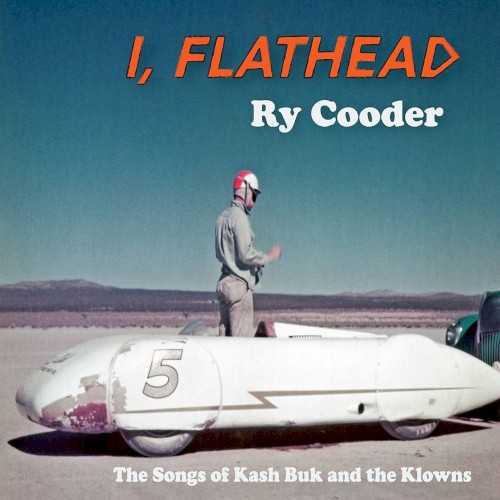 | Album: 32 of 40 Title: I, Flathead Released: 2008-06-23 Tracks: 14 Duration: 53:06 Scroll: Up Down Top Bottom 25% 50% 75% Spotify Allmusic Wikipedia AlbumCover | 1 Drive Like I Never Been Hurt (04:07) 2 Waitin for Some Girl (03:48) 3 Johnny Cash (03:08) 4 Can I Smoke in Here? (04:19) 5 Steel Guitar Heaven (03:40) 6 Ridin With the Blues (03:01) 7 Pink-O Boogie (03:05) 8 Fernando Sez (04:44) 9 Spayed Kooley (02:09) 10 Filipino Dancehall Girl (03:54) 11 My Dwarf Is Getting Tired (03:59) 12 Flathead One More Time (03:12) 13 5000 Country Music Songs (06:41) 14 Little Trona Girl (03:13) |
| I, Flathead : Allmusic album Review : Ry Cooder has always been a musical storyteller, from his self-titled debut album (which featured both well-known and under-recognized folk, blues, swing, and jug tunes) to Boomers Story, his last two offerings for Nonesuch (Chavez Ravine and My Name Is Buddy), and his many film scores (including those for The Long Riders, Paris, Texas, Last Man Standing, Geronimo, and The End of Violence, just to mention a few). When his contributions as a musicologist, producer, and collaborator -- such as his contributions to the various Buena Vista Social Club recordings (including the film score) and his work with V.M. Bhatt, Pops Staples, Ersi Arvizu, and guitarist Manuel Galbán of Los Zafiros -- are included, he becomes a genuine mythmaker. I, Flathead contributes to the weight of Cooders legend in many ways. First, theres the title, an obvious nod to the late Isaac Asimovs I, Robot; then theres the legend -- the entire story is told in a 100-page, hardbound novella that accompanies the Deluxe Edition -- about beatnik, country music nut, and salt-flats racer Kash Buk, his band the Klowns, the strange and wonderful extraterrestrial visitor called Shakey, and the Passenger who pursues him. Its even subtitled "The Songs of Kash Buk and the Klowns." Finally, theres the music; its a set of 14 original tunes that employ everything from country rockabilly to blues; strange, shimmering exotica; and Latin-influenced rock, swing, and mariachi music. Musically, there isnt anything here you havent heard from Cooder before, but its shaken and stirred differently and owes a nod or two to Tom Waits deadpan storytelling manner. This album doesnt have the futuristic Latin groove of Chavez Ravine or the traveling dust-bowl balladic country and folk that was on My Name Is Buddy, but it is simultaneously as welcoming and off-putting as both those earlier records. The songs can be enjoyed with or without the novella, as they were meant to stand apart. The story in it is directly related, but there is a story the recording tells on its own. The sound of the record is frighteningly crystalline for roots-oriented music -- the dirty-assed bottleneck slide guitar-fueled "Ridin with the Blues," with drummer Jim Keltner and guitarist Rene Camacho, feels too clean despite its tempo and loose vibe. "Pink-O Boogie" follows with the same band -- with added percussion from Joachim Cooder -- but the groove is nastier and dirtier, and feels like it could have come from the Get Rhythm album in 1987. Near the end, Jesús Guzmán arranges some crazy string work to take it out. The rootsy rocker "Waitin for Some Girl," where Cooder plays everything but drums (courtesy of Martin Pradler) sounds like a lost John Hiatt tune from Rys Slide Area period (its also better than anything that Hiatt has come up with himself in ages). Old pal Flaco Jiménez lends his accordion to "Filipino Dancehall Girl," a beautiful norteño tune that is kissed by cha-cha in Joachims rhythms. "Spayed Kooley" is, as one might expect, a humorous Western swing jam, but played by a basic rock trio. And then theres the beautifully articulated swing ballad "My Dwarf Is Getting Tired," one of the more beautifully warm broken love songs Cooder has ever written -- and the string touches by Guzmán make it a shuffling lounge fave. Ultimately, "quirky" doesnt begin to describe I, Flathead, but it doesnt have to: this disc is simultaneously both vintage and futuristic Cooder doing what he does best, offering listeners ghost traces of the past as they materialize on the dusty desert horizon like a mirage. | ||
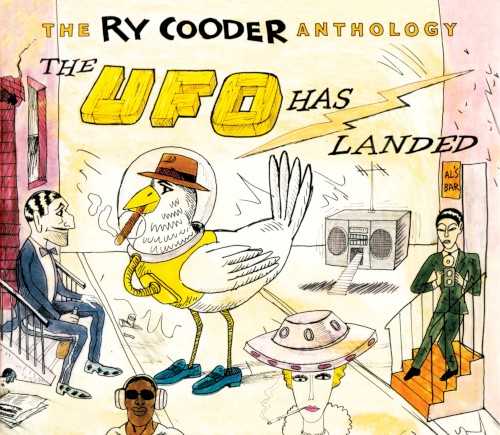 | Album: 33 of 40 Title: The Ry Cooder Anthology: The UFO Has Landed Released: 2008-11-21 Tracks: 34 Duration: 2:13:45 Scroll: Up Down Top Bottom 25% 50% 75% Spotify Allmusic AlbumCover | 1 Get Rhythm (03:19) 2 Low-Commotion (03:11) 3 Available Space (02:14) 4 On a Monday (02:57) 5 Do Re Mi (03:02) 6 Which Came First (03:47) 7 The Very Thing that Makes You Rich (Makes Me Poor) (05:31) 8 Down in Hollywood (04:18) 9 Smells Like Money (02:28) 10 Lets Work Together (03:12) 11 I Got Mine (04:29) 12 Cherry Ball Blues (04:13) 13 Jesus on the Mainline (04:11) 14 Tattler (04:20) 15 Teardrops Will Fall (03:07) 16 Maria Elena (04:32) 17 Jesse James (05:05) 1 Paris, Texas (02:55) 2 Theme From Southern Comfort (02:57) 3 Tamp Em Up Solid (03:22) 4 Billy the Kid (03:49) 5 Crazy Bout an Automobile (Every Woman I Know) (05:05) 6 Drive Like I Never Been Hurt (04:07) 7 Feelin Bad Blues (04:18) 8 Boomers Story (04:15) 9 How Can You Keep Moving (Unless You Migrate Too) (02:28) 10 Alimony (02:56) 11 Always Lift Him Up / Kanaka Wai Wai (06:03) 12 Theme From Alamo Bay (05:10) 13 Dark End of the Street (03:27) 14 Why Dont You Try Me (04:58) 15 Poor Mans Shangri-La (05:27) 16 Going Back to Okinawa (04:42) 17 Little Sister (03:47) |
| The Ry Cooder Anthology: The UFO Has Landed : Allmusic album Review : The first multi-label spanning, American released Ry Cooder compilation does its best to present a coherent portrait of a musician whose wildly eclectic recordings and broad, four decade (and counting) list of releases makes that job all but impossible. Certainly the guitarist/singer/songwriter/producer and coordinator of the successful Buena Vista Social Club reunion deserves a comprehensive box set. But even then it would be difficult to follow his diverse recorded accomplishments that range from 60s work with Captain Beefheart and Taj Mahal, to sessions with Little Feat and the Rolling Stones, world music side projects, outside productions of other artists, and over a dozen solo albums that mix folk, soul, funk, rock, country blues, gospel, and Tex-Mex, among other styles. This 34-cut double-disc package, compiled by Cooders son and musical companion Joachim, does an excellent job cherrypicking well-known nuggets along with a batch of obscurities from his fathers voluminous output, resulting in an intriguing, enlightening, and above all listenable sonic résumé. Rather than arrange his fathers songs in chronological order, the younger Cooder decided to take the organic approach of presenting the material in a more cohesive fashion. He mixes and matches items from papa Cooders 1970 debut through 2008s I, Flathead to maximum effect without the jarring segues that might occur if sequencing was done in a time based manner. The elder Cooder provides short, occasionally odd, usually humorous blurbs about each track in the accompanying booklet, shedding a bit of light on the tunes, and in the case of the selections from films such as Southern Comfort, The Long Riders, and Paris, Texas, the directors he worked with. One previously unreleased tune, a passable version of "Lets Work Together" performed with Buckwheat Zydeco is here, perhaps as an enticement to collectors. But its Joachims excavations into his dads deep catalog to resurrect oddities such as "Smells Like Money" from the Johnny Handsome flick and gems like the Willie Dixon/Cooder jointly composed "Which Came First" from The Slide Area that make this collection so enjoyable. Eagle eyed admirers might lament that nothing from 1978s impressive genre excursion Jazz is included, but Cooders phenomenal slide guitar skills, and somewhat limited vocal abilities, are well displayed throughout the two-and-a-quarter hour running time. The song that helps provide the unusual title for the disc, "UFO Has Landed in the Ghetto," is M.I.A. and surely there are fan favorites that didnt make the cut due to limited space, but this is an impressive and relatively inclusive recap that is a fine starting point for anyone interested in delving into Ry Cooders extensive and influential career. | ||
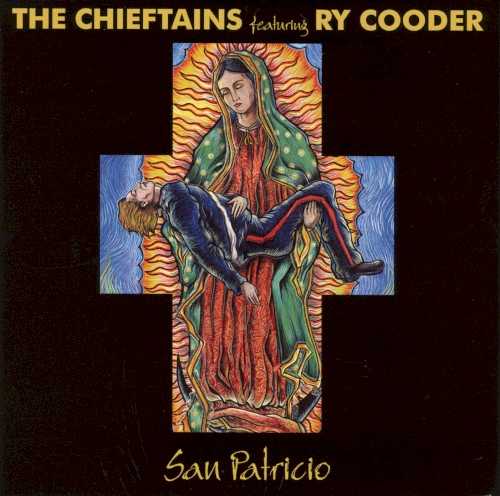 | Album: 34 of 40 Title: San Patricio Released: 2010-03-08 Tracks: 19 Duration: 1:01:48 Scroll: Up Down Top Bottom 25% 50% 75% Wikipedia Allmusic AlbumCover | 1 La iguana (03:35) 2 La golondrina (03:10) 3 A la orilla de un palmar (03:33) 4 Danza de concheros (01:30) 5 El chivo (02:07) 6 San Campio (02:47) 7 The Sands of Mexico (04:47) 8 Sailing to Mexico (02:02) 9 El caballo (02:42) 10 March to Battle (Across the Rio Grande) (04:12) 11 Lullaby for the Dead (04:38) 12 Luz de luna (03:31) 13 Persecución de Villa (02:57) 14 Canción mixteca (intro) (02:55) 15 Canción mixteca (03:15) 16 Ojitos negros (02:26) 17 El relampago (03:17) 18 El pájaro cu (02:37) 19 Finale (05:47) |
| San Patricio : Allmusic album Review : To delve into history is to reach into mystery. Music is a time-honored method for investigating both. The Chieftains Paddy Moloney has been obsessed with the historical account of the San Patricios, a band of immigrant Irish soldiers who deserted the American Army during the Mexican-American War in 1846 to fight for the other side, against the Manifest Destiny ideology of James Polks America. Moloney’s Chieftains and co-producer Ry Cooder decided to try to tell it musically. The result brings this fascinatingly complex tale to life in the modern world and examines issues of discrimination, conscience, and empire. The knowledge of Argentinian radio programmer Guadalupe Jolicouer pointed Moloney to traditional Mexican sources -- canciones, sons, norteños, rancheras, boleros, and polkas from the period. Moloney sorted them. He then selected, arranged, and added music he knew from the period that echoed the Irish sources. He and Cooder rounded up the numerous players, instruments, and locales necessary. Mexican performers such as los Tigres del Norte, Lila Downs, Chavela Vargas, los Folkloristas, los Camperos de Valles, and many others are featured alongside the Chieftains, Cooder, Linda Ronstadt, Galician piper Carlos Nunez, Liam Neeson, and Van Dyke Parks. Sessions were taped in Mexico, Spain, Los Angeles, New York, and Dublin. Sung in Spanish and English, the collection illumines the San Patricios’ chapter in Irish history, which was considered shameful until recently -- though in Mexico they’ve always been regarded as heroes. Through utterly compelling and ingenious musical preservation and invention, the album asks questions about commonalities between cultures; it offers evidence that history, when told personally enough, reflects shared experiences across territorial and chronological lines, and stands outside any “official” narrative, mirroring back to listeners what they can feel empathy for and sympathize with. While this album sounds like the Chieftains playing in fusion mode, it is so much more ambitious than anything they’ve attempted before. Some of the music here is contemporary, though much of it is over a century old; yet it reaches past its settings into the present day, telling of the indelibly rich meeting of two cultures oppressed by a third. It’s full of gorgeous songs of heroism, love, tragedy, and loss. San Patricios songs are sung passionately, without artifice, theyre played expertly. The album may jar some listeners initially, but spending a little time with it will remedy that. San Patricio, more than merely satisfying Moloney’s obsession, raises more questions about what stories lay hidden under the floorboards of history than it answers, thank goodness. Music this beautifully articulated allows cultures to talk to one another across time, space, language, and other divides. | ||
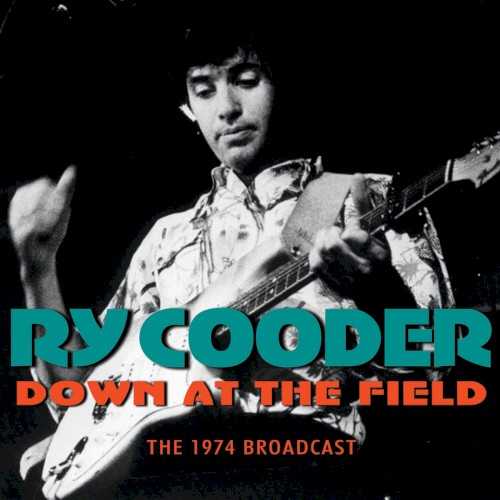 | Album: 35 of 40 Title: Down At The Field: The 1974 Broadcast Released: 2011 Tracks: 15 Duration: 1:12:21 Scroll: Up Down Top Bottom 25% 50% 75% Allmusic AlbumCover | 1 Too Tight This Rag of Mine (03:02) 2 Youre Doin Something Wrong (05:10) 3 Blind Man Messed Up by Tear Gas (05:50) 4 [instrumental] (03:06) 5 How Can a Poor Man Stand Such Times? (07:34) 6 Slow Consumption (07:46) 7 Forget That Folding Bridge (06:25) 8 Fool for a Cigarette / Feelin Good (05:05) 9 Crazy bout an Automobile (Every Woman I Know) (05:02) 10 Feelin Like a Submarine (04:55) 11 Dont Take Everybody to Be a Friend (04:11) 12 The Tattler (05:45) 13 One Meat Ball (01:36) 14 Preacher (02:51) 15 Vigilante Man (04:03) |
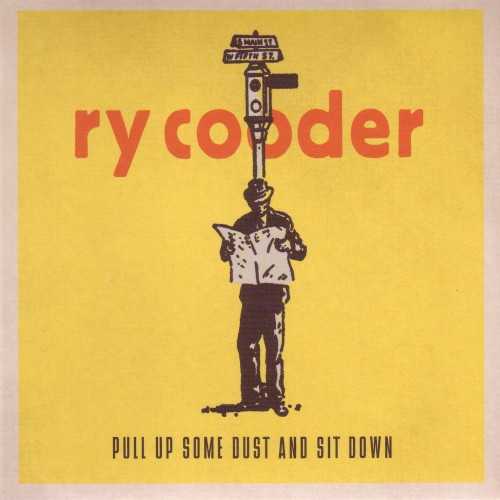 | Album: 36 of 40 Title: Pull Up Some Dust and Sit Down Released: 2011-08-29 Tracks: 28 Duration: 2:02:46 Scroll: Up Down Top Bottom 25% 50% 75% Spotify TrackSamples Allmusic AlbumCover | 1 No Banker Left Behind (03:36) 2 El Corrido de Jesse James (04:17) 3 Quick Sand (03:17) 4 Dirty Chateau (05:29) 5 Humpty Dumpty World (04:18) 6 Christmas Time This Year (02:49) 7 Baby Joined the Army (06:35) 1 Lord Tell Me Why (03:01) 2 I Want My Crown (02:37) 3 John Lee Hooker for President (06:08) 4 Dreamer (05:06) 5 Simple Tools (05:07) 6 If Theres a God (03:06) 7 No Hard Feelings (05:52) 1 No Banker Left Behind (03:36) 2 El Corrido de Jesse James (04:17) 3 Quick Sand (03:17) 4 Dirty Chateau (05:29) 5 Humpty Dumpty World (04:18) 6 Christmas Time This Year (02:49) 7 Baby Joined the Army (06:35) 8 Lord Tell Me Why (03:01) 9 I Want My Crown (02:37) 10 John Lee Hooker for President (06:08) 11 Dreamer (05:06) 12 Simple Tools (05:07) 13 If Theres a God (03:06) 14 No Hard Feelings (05:52) |
| Pull Up Some Dust and Sit Down : Allmusic album Review : Pull Up Some Dust and Sit Down, issued between two national election cycles, is the most overtly political album Ry Cooder has ever released, and one of his funniest, most musically compelling ones, too. Cooder looks deeply into his musical past using his entire Americana musical arsenal: blues, folk, ragtime, norteño, rock, and country here. Opener "No Banker Left Behind" updates Civil War-era marching music. Cooders guitar, banjo, bass, and mandola lead drummer (and son) Joachim through a scathing indictment of the the financial bailout in 2007. The marching rhythms are punched through with sharp banjo and mandola riffs as Cooders signature electric guitar sound frames them. "El Corrido Jesse James" has the outlaw speaking from heaven in waltz time. Accompanied by Flaco Jimenezs accordion and a horn section, James claims that while he was a bank robber, he never "turned a family from their house," and asks God for his trusty .44 to "put that bonus money back where it belongs." "Quick Sand" is a shuffling electric rocker that addresses the plight of illegal immigrants crossing into Arizona. "Christmas Time This Year" is the most incendiary anti-war song in a decade, presented innocently as a Mexican polka. "Lord Tell Me Why" borrows production techniques from Tom Waits, with co-writer and drummer Jim Keltner who assists in getting across this biting, ironic gospel tune: "Lord tell me why a white man/Aint worth nothin in this world no more...." An 11-piece band assists in "I Want My Crown," a scorching, growling blues with Cooders nasty guitar leading the charge. Its followed by the albums finest moment, "John Lee Hooker for President," where Cooder does a shockingly accurate impression of the late bluesman, in fine boogie mode, paying a visit to the White House, not liking what he sees, and deciding to run for office: "Im compastatic. I aint Republican or Democratic." He names Jimmy Reed as Veep and Johnny Taylor Secretary of State. His campaign promises swift retribution for injustice and a "groove time" for the nation. If only. The depth of Cooders rage is quieter but more direct as the album draws to a close. In "If There Is a God," Gods been driven from heaven by redistricting; he, "Jesus, Mary and Joe" all hit the road for Mexico. God goes so far as to say he thinks the "Republiklan" legislature wants to bring back Jim Crow laws. Cooders sorrow about the environment is pervasive in the final corrido, though he, like the Buddha, leaves room for tolerance, wishing his enemies "No Hard Feelings." Those whove followed Cooder from the beginning will find much to love on Pull Up Some Dust and Sit Down. Those music fans unfamiliar with his work but looking for a comrade in arms will find one here. That said, this is revolution music; worthy of dancing to, learning from, and singing along with: who says topical music has to be boring? | ||
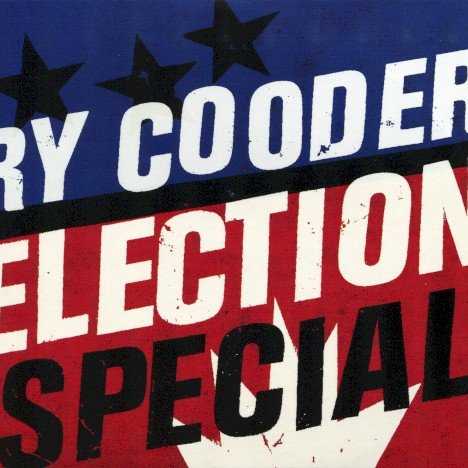 | Album: 37 of 40 Title: Election Special Released: 2012-08-20 Tracks: 9 Duration: 38:37 Scroll: Up Down Top Bottom 25% 50% 75% Spotify Allmusic Wikipedia AlbumCover | 1 Mutt Romney Blues (03:45) 2 Brother is Gone (05:03) 3 The Wall Street Part of Town (03:42) 4 Guantanamo (03:28) 5 Cold Cold Feelings (05:25) 6 Going to Tampa (03:57) 7 Kool-Aid (04:10) 8 The 90 and the 9 (05:15) 9 Take Your Hands Off It (03:47) |
| Election Special : Allmusic album Review : The risk in writing political songs, especially about specific issues and historical periods, is that over time, those that are run of the mill become dated. Not everyone can write timeless tunes like Woody Guthrie, Sam Cooke, John Lennon, and Bob Marley. Given the content of Election Special, Ry Cooder knew the risks going in and welcomed them. Using American traditional musics -- raw blues, folk, and roots rock -- Cooders songs express what he considers to be, as both an artist and a pissed-off citizen, the high-stakes historical gamble of the 2012 presidential and congressional contest. He wrote and recorded this album as a witness to the era. Other than drums (played by his son Joachim) and some backing vocals, Cooder plays everything here. He uses foreboding acoustic blues in "Mutt Romney Blues" (written from the point of view of the candidate Mitt Romneys dog). The more poignant "Brother Is Gone" is at first blush a seemingly heart-wrenching folk tale fueled by Cooders mandolin. Yet it slowly and purposely relates a deal-with-the-devil fantasy about conservatives Charles and David Koch. Its among the finest songs hes written. But Cooder rocks up his anger too: "Guantanamo" is a raucous barroom strut. "Cold Cold Feeling" is a deep, slow garage blues thats chilling in its effectiveness. His screed is a link in a chain of political blues tunes that date back to the Delta. "Going to Tampa" is a cut-time string band country tune. Its a farce about the 2012 Republican National Convention as hijacked by the Tea Party. He accuses both of outright racism and social engineering, with scathing humor. The albums finest cut is the dark, Delta-style electric blues of "Kool-Aid," which recalls Junior Kimbrough musically. Guthries own spirit is evoked in the antiwar narrative "The 90 and the 9," with its singalong choruses. Election Special closes with a scorching, rocking blues entitled "Take Your Hands Off It." Its a militant anthem that demands that the Constitution and Bill of Rights be returned to their rightful place at the heart of mainstream American life. Sure enough, because of its soapbox style, Election Special is the most overtly political album of Cooders career. As such, it serves two purposes: one is that it is the most organic record hes issued in almost two decades; and, more importantly, it restores topical protest music to a bona fide place in American cultural life. | ||
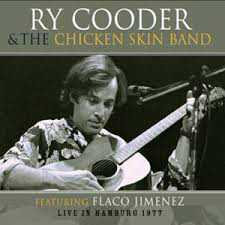 | Album: 38 of 40 Title: Live in Hamburg 1977 Released: 2013-06-14 Tracks: 10 Duration: 47:57 Scroll: Up Down Top Bottom 25% 50% 75% Allmusic AlbumCover | 1 Stand by Me (04:16) 2 Tattler (04:24) 3 The Dark End of the Street (04:07) 4 One Meat Ball (04:53) 5 Fool for a Cigarette (04:48) 6 Tamp Em Up Solid (04:06) 7 Let Your Light Shine on Me (04:48) 8 Do E Mi (06:24) 9 Goodnight Irene (05:07) 10 Volver, Volver (05:00) |
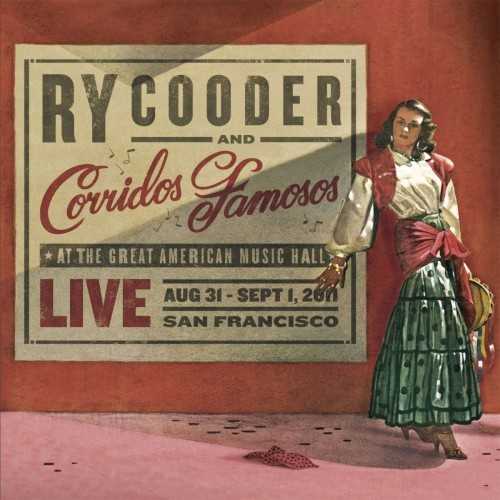 | Album: 39 of 40 Title: Live in San Francisco Released: 2013-09-06 Tracks: 12 Duration: 1:13:05 Scroll: Up Down Top Bottom 25% 50% 75% Spotify AlbumCover | 1 Crazy Bout an Automobile (05:08) 2 Why Dont You Try Me (05:29) 3 Boomers Story (04:42) 4 Lord Tell Me Why (06:18) 5 Do Re Mi (05:43) 6 School Is Out (05:02) 7 The Dark End of the Street (07:32) 8 El Corrido de Jesse James (06:16) 9 Wooly Bully (04:59) 10 Volver Volver (06:30) 11 Vigilante Man (08:19) 12 Goodnight Irene (07:07) |
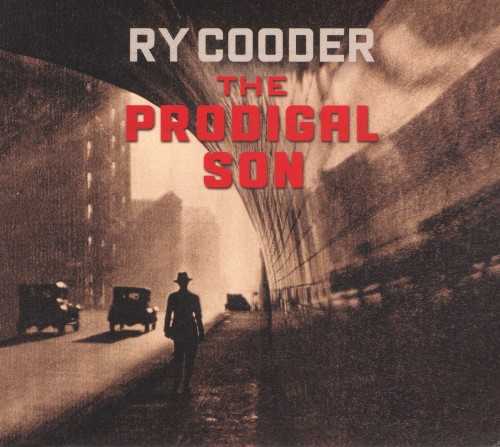 | Album: 40 of 40 Title: The Prodigal Son Released: 2018-05-11 Tracks: 11 Duration: 49:55 Scroll: Up Down Top Bottom 25% 50% 75% Spotify TrackSamples Allmusic AlbumCover | 1 Straight Street (04:00) 2 Shrinking Man (04:07) 3 Gentrification (03:14) 4 Everybody Ought To Treat a Stranger Right (03:46) 5 The Prodigal Son (04:38) 6 Nobody’s Fault But Mine (06:08) 7 You Must Unload (05:26) 8 I’ll Be Rested When the Roll Is Called (03:12) 9 Harbor of Love (05:47) 10 Jesus and Woody (05:58) 11 In His Care (03:39) |
| The Prodigal Son : Allmusic album Review : After Ry Cooder issued 2012s biting Election Special with its indictments of the GOP, Mitt Romney, and the Koch Brothers in a meld of sounds that included folk, blues, and roots rock, fans wondered where hed go next. Prodigal Son, his debut album for Fantasy, takes him back to the beginning when he recorded old blues, gospel, folk, and swing tunes that reflected the musical past as illumination for the historical present. Co-produced with son Joachim -- who also contributes drums and percussion -- Cooder takes control; he plays guitars, bass, banjo, mandolin, and keyboards in a program of eight covers and three fine originals. He opens with an intimate version of the Pilgrim Travelers 1950s gospel hit "Straight Street." With banjo and mandolin buoyed by his electric guitar fills and Joachims snare, Cooder presents evidence of his protagonists difficulties living "...on Broadway right next to the liars house...." before finding solace in Gods light. The backing chorus (featuring the late Terry Evans) slips and sways, underscoring every syllable. Cooder doesnt need to testify vocally, the lyrics and his guitar do that. "Shrinking Man" is an original filled with poignant metaphor set to a raucous, bluesy country stomp delivered in electric jug band style. The original "Gentrification" offers biting social satire adorned with layers of acoustic and electric guitars played in Nigerian hi-life style with kalimba, bells, and whistles; its humorous lyrics are rife with the truth. Cooders readings of Blind Willie Johnsons "Everybody Ought to Treat a Stranger Right" and "Nobodys Fault But Mine" resonate with conviction and gritty determination. Alfred Reeds hymn "You Must Unload" features Robert Francis Commagere on bass and Aubrey Haynie on violin. They color his prophetic vocal in calling the powerful, greedy, and decadent to account. The title cut is traditional. Cooder renders it a grimy, electric, country blues -- complete with an homage to country legend Ralph Mooneys pedal steel guitar playing. Banjo, mandolin, and snares create a frame for Blind Roosevelt Graves strident "Ill Be Rested When the Roll Is Called," while Carter Stanleys "Harbor of Love" has been recontextualized as a gently soulful, painterly, country-gospel tune. Cooders own "Jesus and Woody" is a tender allegory sung from the formers viewpoint as he requests the legendary folksinger to sit and play for him as he reflects on sin, fascism, and the dream of a better world. This would have been a great place to stop, but Cooder has another rocker to deliver in the traditional church stomper "In His Care," where crisscrossing rhythms and gospel strut meet rebellious roots rock & roll. His reliance on gospel here illuminates his commitment to equality. Prodigal Son is yet another act of committed intention from one of American musics greatest guardians and purveyors. In its grain, aesthetic pleasure and the will for justice converse and ultimately convince the rest of us to act. | ||